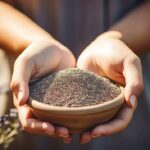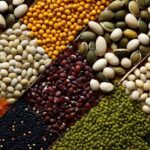Chia Seeds in Gluten-Free Diets
Chia’s Safety in a Gluten-Free Diet Explored

It is commonly recognized that following a gluten-free diet is important, but did you know that certain foods may still pose risks? This article explores whether chia seeds are suitable for consumption while on a gluten-free diet.
With evidence-based research, we’ll delve into the potential risks of gluten contamination and provide tips for safely incorporating chia seeds.
So, if you’re looking to maintain a healthy gluten-free lifestyle, keep reading to learn more about chia’s role in your diet.
Key Takeaways
- Chia seeds are naturally gluten-free and can be safely incorporated into a gluten-free diet.
- Chia seeds are high in fiber and omega-3 fatty acids, which can benefit gut health and overall well-being.
- It is important to choose certified gluten-free chia seeds and store them in a gluten-free environment to avoid contamination risks.
- More research is needed to fully understand the effects of chia seeds on gluten sensitivity, but incorporating them into a gluten-free diet may have positive impacts on gut health and omega-3 intake.
The Gluten-Free Diet Basics
When following a gluten-free diet, it’s important to understand the basics in order to maintain a healthy and safe lifestyle. The benefits of a gluten-free diet extend beyond those with celiac disease or gluten sensitivities. It can improve digestive health, increase energy levels, and promote overall well-being. By eliminating gluten, individuals often experience reduced inflammation and improved nutrient absorption.
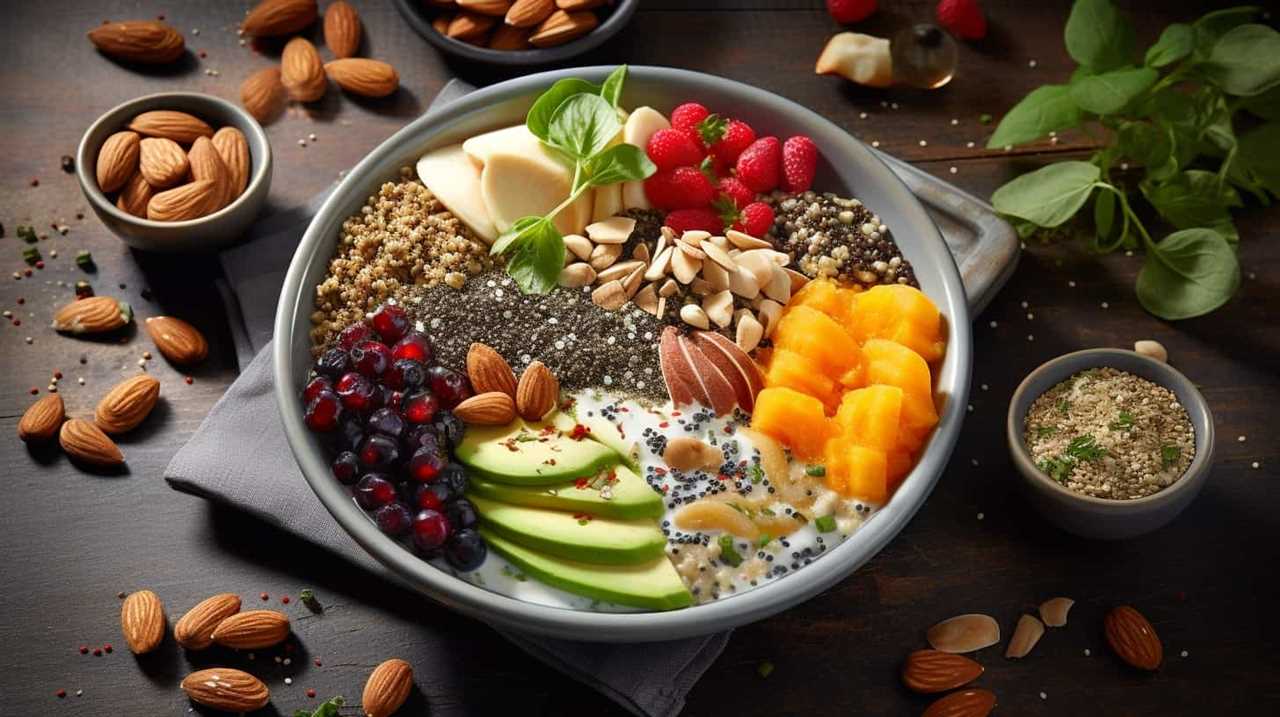
To successfully follow a gluten-free diet, it’s crucial to know the common substitutes for gluten-containing foods. Some popular alternatives include almond flour, coconut flour, and tapioca flour. These substitutes can be used in baking and cooking to create delicious gluten-free versions of favorite dishes. Other gluten-free options include quinoa, rice, and corn, which can be used as substitutes for grains. Additionally, there are many gluten-free packaged products available, such as bread, pasta, and snacks, to make the transition easier.
Understanding the benefits of a gluten-free diet and familiarizing oneself with common gluten-free substitutes are essential for maintaining a healthy and enjoyable gluten-free lifestyle.
Understanding Chia Seeds
To continue our exploration of a gluten-free diet and its benefits, let’s delve into understanding chia seeds. Chia seeds are small, oval-shaped seeds that come from the Salvia hispanica plant, which is native to Mexico. These tiny seeds pack a powerful nutritional punch and have become increasingly popular in recent years.
Here are some key benefits of chia seeds:
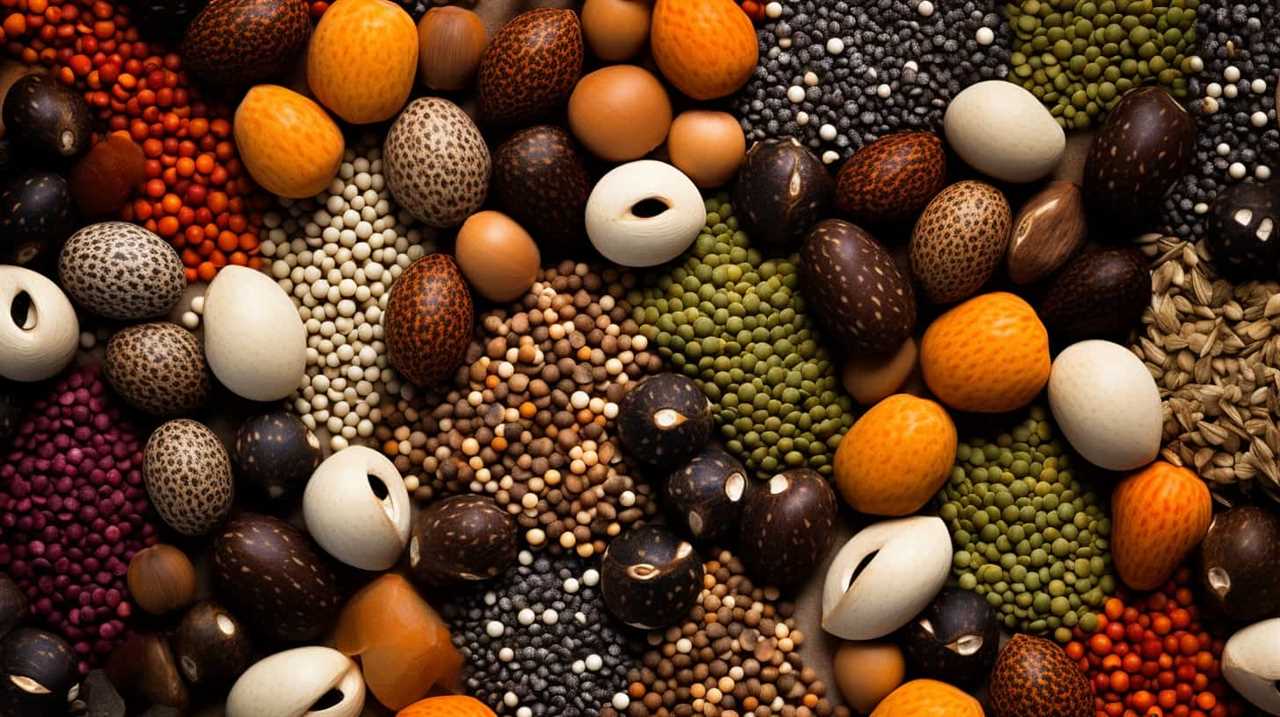
- High in omega-3 fatty acids: Chia seeds are an excellent plant-based source of omega-3 fatty acids, which are important for brain health and reducing inflammation in the body.
- Rich in fiber: One ounce of chia seeds contains a whopping 10 grams of fiber, which can help regulate digestion and promote feelings of fullness.
- Versatile in recipes: Chia seeds can be incorporated into a variety of recipes, including smoothies, puddings, and baked goods, adding a nutritional boost to your favorite dishes.
Incorporating chia seeds into your gluten-free diet can provide numerous health benefits. From improving heart health to aiding in digestion, chia seeds are a versatile and nutritious addition to any meal. Try experimenting with chia seed recipes to discover delicious and creative ways to enjoy these beneficial seeds.
Potential Gluten Contamination Risks
There are several potential gluten contamination risks to be aware of when incorporating chia seeds into a gluten-free diet. Cross contamination is one such risk, as chia seeds may come into contact with gluten-containing grains during the manufacturing process or while being transported or stored. To mitigate this risk, it’s important to choose certified gluten-free chia seeds and ensure they’re stored in a gluten-free environment.
Additionally, hidden sources of gluten in chia products should be considered. Some chia seed mixes or products may contain added ingredients, such as flavorings or fillers, that could potentially contain gluten. It’s crucial to carefully read labels and choose products that are specifically labeled as gluten-free.
Research on Chia Seeds and Gluten Sensitivity
Continuing our exploration of chia seeds’ safety in a gluten-free diet, we delve into the research surrounding chia seeds and their potential impact on individuals with gluten sensitivity.
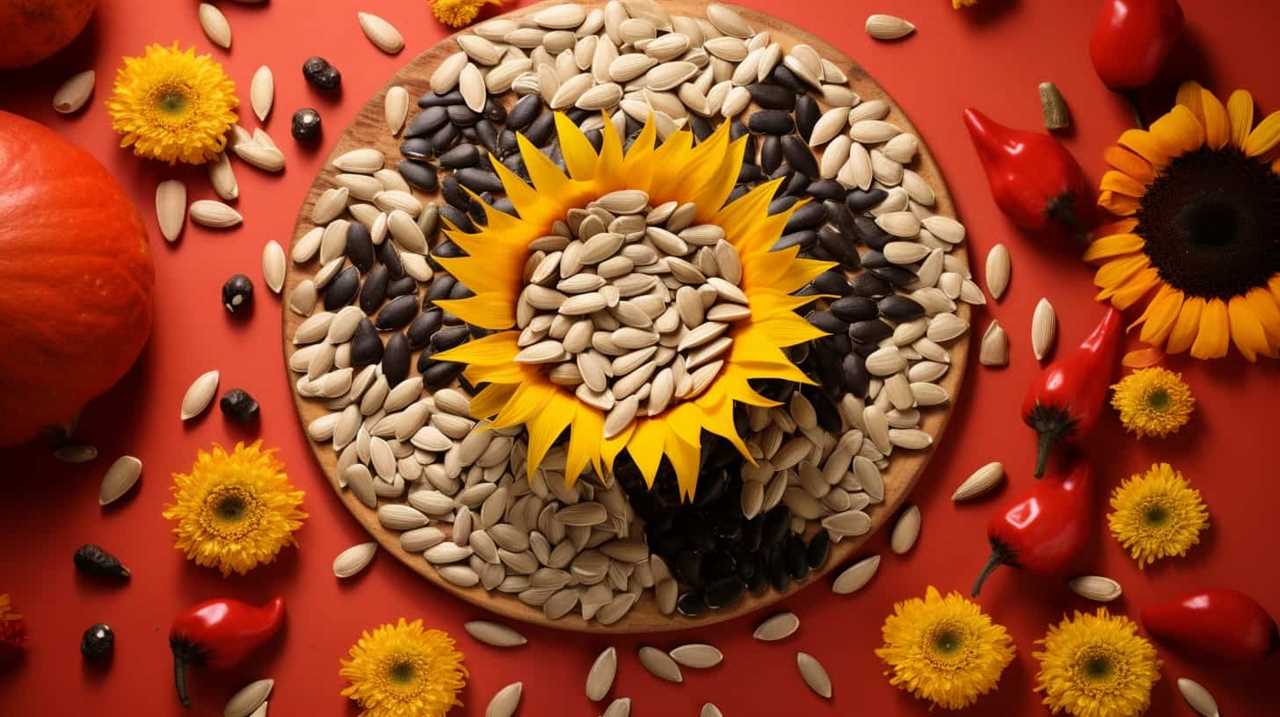
While chia seeds themselves are naturally gluten-free, it’s important to consider their effects on gut health and their potential as a source of omega-3 fatty acids.
- Chia seeds and gut health: Research suggests that chia seeds may have a positive impact on gut health due to their high fiber content. The soluble fiber in chia seeds can help promote regular bowel movements and support a healthy digestive system.
- Chia seeds as a source of omega-3 fatty acids: Chia seeds are one of the richest plant-based sources of omega-3 fatty acids, specifically alpha-linolenic acid (ALA). These fatty acids play a crucial role in reducing inflammation and supporting heart health.
While more research is needed, incorporating chia seeds into a gluten-free diet may provide additional benefits for individuals with gluten sensitivity, including improved gut health and increased intake of omega-3 fatty acids.
Tips for Safely Incorporating Chia Seeds in a Gluten-Free Diet
When considering the safe incorporation of chia seeds in a gluten-free diet, it’s important to prioritize proper handling and storage practices. To ensure safe storage, it’s recommended to store chia seeds in an airtight container in a cool, dry place, away from direct sunlight. This will help prevent the seeds from going rancid and maintain their freshness.
Additionally, it’s crucial to check the expiration date before using chia seeds. When using chia seeds in gluten-free recipes, it’s advisable to follow trusted and reliable recipes specifically designed for gluten-free diets. There are numerous chia seed recipes available that cater to gluten-free individuals, including chia seed pudding, chia seed crackers, and chia seed muffins.
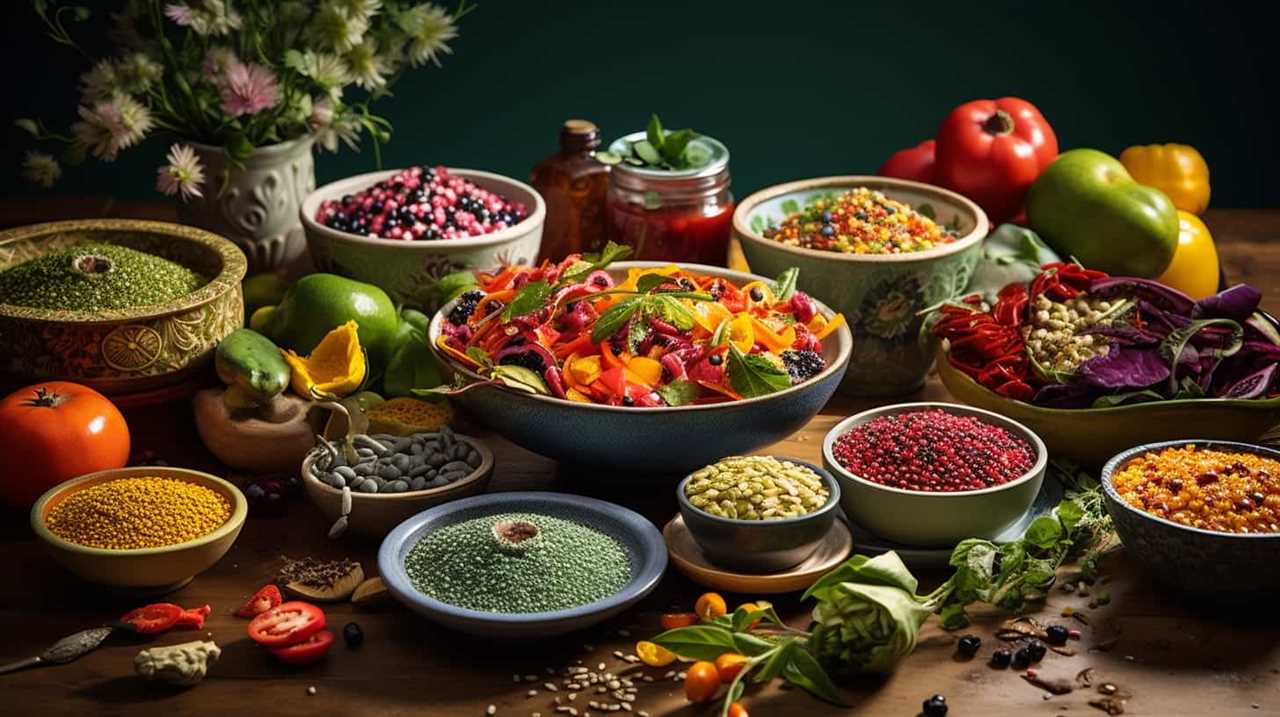
Frequently Asked Questions
Are Chia Seeds Naturally Gluten-Free?
Yes, chia seeds are naturally gluten-free. They can be a safe option for individuals with celiac disease or gluten sensitivity. However, it’s always important to read labels and ensure that there is no cross-contamination.
Can Chia Seeds Be Cross-Contaminated With Gluten During Processing?
Certainly, chia seeds can be cross-contaminated with gluten during processing. To minimize these risks, look for chia seeds with gluten-free certification. It ensures the seeds have undergone rigorous testing and meet gluten-free standards.
How Can I Identify if Chia Seeds Have Been Contaminated With Gluten?
To identify gluten contamination in chia seeds, we can use testing methods specifically designed for gluten detection. These methods allow us to ensure the safety of chia seeds in a gluten-free diet.
Are There Any Studies That Prove Chia Seeds Are Safe for Individuals With Gluten Sensitivity?
There have been studies conducted on chia seeds and their safety for those with gluten sensitivity. These studies suggest that chia seeds can be a safe and healthy alternative with potential health benefits.

What Are Some Potential Risks of Incorporating Chia Seeds Into a Gluten-Free Diet?
Incorporating chia seeds into a gluten-free diet has potential health benefits, including aiding in weight loss. However, it is important to be aware of potential risks, such as digestive issues or allergies.
Conclusion
In conclusion, chia seeds can be safely incorporated into a gluten-free diet without the risk of contamination. Research has shown that chia seeds are naturally gluten-free and don’t pose a threat to those with gluten sensitivity.
By understanding the basics of the gluten-free diet and taking precautions to ensure the purity of chia seeds, individuals can confidently enjoy the nutritional benefits they offer.
So go ahead and sprinkle some chia seeds on your favorite gluten-free dishes, and watch your health flourish like a vibrant garden.
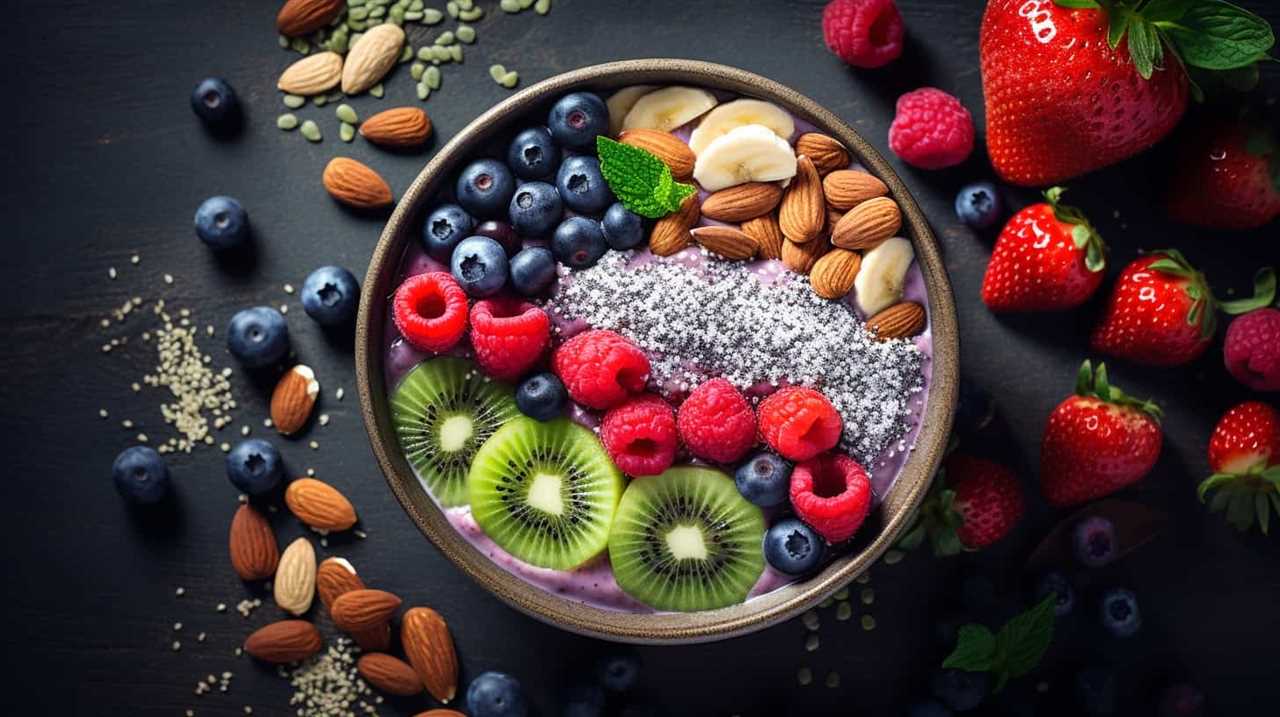
Hi, I’m Sarah. I write for Turtle Tree Seeds, a news blog that loves food – all kinds of food. But especially bacon, chocolate, and veggies. We’re on a mission to show the world that you can enjoy all of those things, even kale and brussels sprouts. Because we believe that when it comes to food, there’s no such thing as guilty pleasures. Just pleasures.
I’m also a huge fan of puns (obviously).
Chia Seeds in Gluten-Free Diets
11 Tips for Incorporating Super Seeds in Gluten-Free Recipes

We have gathered 11 recommendations for incorporating super seeds into your gluten-free cooking recipes to support our dedication in offering you helpful, research-backed advice.
These tiny powerhouses, like chia seeds, offer numerous benefits for those following a gluten-free diet.
From boosting fiber content to acting as a natural egg replacer, these tips will help you unlock the full potential of super seeds in your cooking.
Get ready to elevate your gluten-free recipes and nourish your body with these nutritious additions!
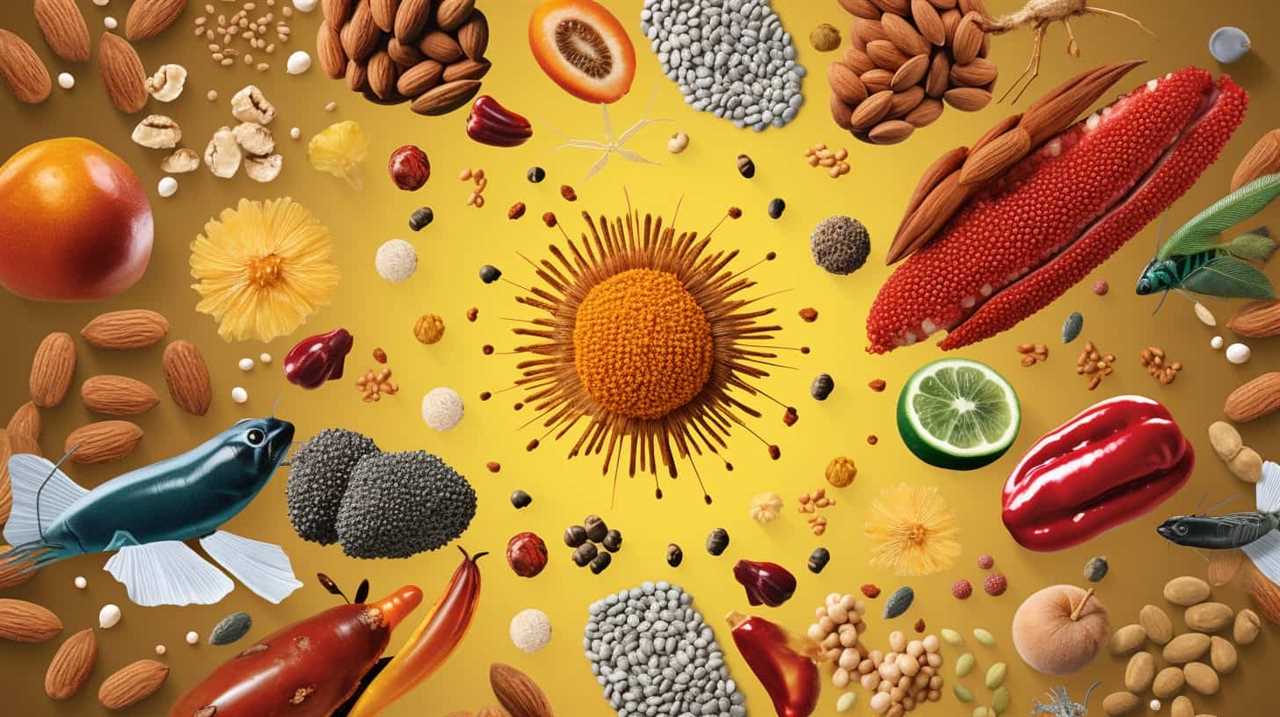
Key Takeaways
- Chia seeds are a beneficial addition to gluten-free diets due to their high fiber content and omega-3 fatty acids.
- Chia seeds can be used as a natural egg replacer in vegan baking, creating a gel-like consistency that adds structure and moisture to recipes.
- Adding chia seeds to recipes such as salad dressings, smoothies, and oatmeal increases the fiber content and adds texture.
- Chia seeds can act as a thickening agent in soups, sauces, and desserts, providing versatility and enhancing the texture of gluten-free recipes.
Benefits of Chia Seeds in Gluten-Free Diets
One of the top three benefits of incorporating chia seeds in our gluten-free diets is their high fiber content. Chia seeds are an excellent source of dietary fiber, with just one ounce of chia seeds providing a whopping 10 grams of fiber. This is great news for those following a gluten-free diet, as fiber helps regulate digestion and can prevent constipation, a common issue for people with celiac disease or gluten sensitivity.
Additionally, chia seeds are a fantastic source of omega-3 fatty acids, which are essential for brain health and reducing inflammation. These tiny seeds are also a popular ingredient in vegan baking, as they can be used as an egg substitute due to their ability to absorb liquid and create a gel-like consistency.
Incorporating chia seeds into your gluten-free diet not only adds nutritional value but also enhances the taste and texture of your favorite recipes.
How to Choose and Store Chia Seeds
When incorporating chia seeds into our gluten-free diets, it’s important to know how to choose and store them properly. Here are some tips to help you make the best choices and ensure that your chia seeds stay fresh and nutritious:

- Choosing organic chia seeds: Look for organic options to avoid exposure to harmful pesticides and chemicals. Organic chia seeds are grown without synthetic fertilizers or pesticides, making them a healthier choice for you and the environment.
- Properly soaking chia seeds: Soaking chia seeds before consuming them can help enhance their nutritional benefits. To soak chia seeds, simply mix them with water or any liquid of your choice and let them sit for about 15 minutes. This helps them absorb the liquid and become gel-like, making them easier to digest.
- Storage: Store your chia seeds in an airtight container in a cool, dry place. This will help prevent them from becoming rancid or losing their nutritional value. Avoid exposing them to heat, moisture, or direct sunlight.
- Expiration date: Check the expiration date on the package before buying chia seeds. Using them before they expire ensures that you get the maximum nutritional benefits.
- Quality: Choose chia seeds that are clean, dry, and free from any signs of mold or moisture. This ensures that you’re getting high-quality seeds that are safe to consume.
Chia Seeds as a Natural Egg Replacer
We love using chia seeds as a natural egg replacer in our gluten-free recipes. Chia seeds aren’t only a great source of nutrients, but they also work as a binding agent, making them an excellent substitute for eggs in vegan baking.
When mixed with water, chia seeds form a gel-like consistency that helps bind the ingredients together, providing structure and moisture to the finished product. To replace one egg, simply combine 1 tablespoon of chia seeds with 3 tablespoons of water and let it sit for about 15 minutes until it thickens.
This chia seed gel can then be used in recipes such as cakes, cookies, and muffins.
Boosting Fiber Content With Chia Seeds
How can chia seeds be used to boost the fiber content in our gluten-free recipes?
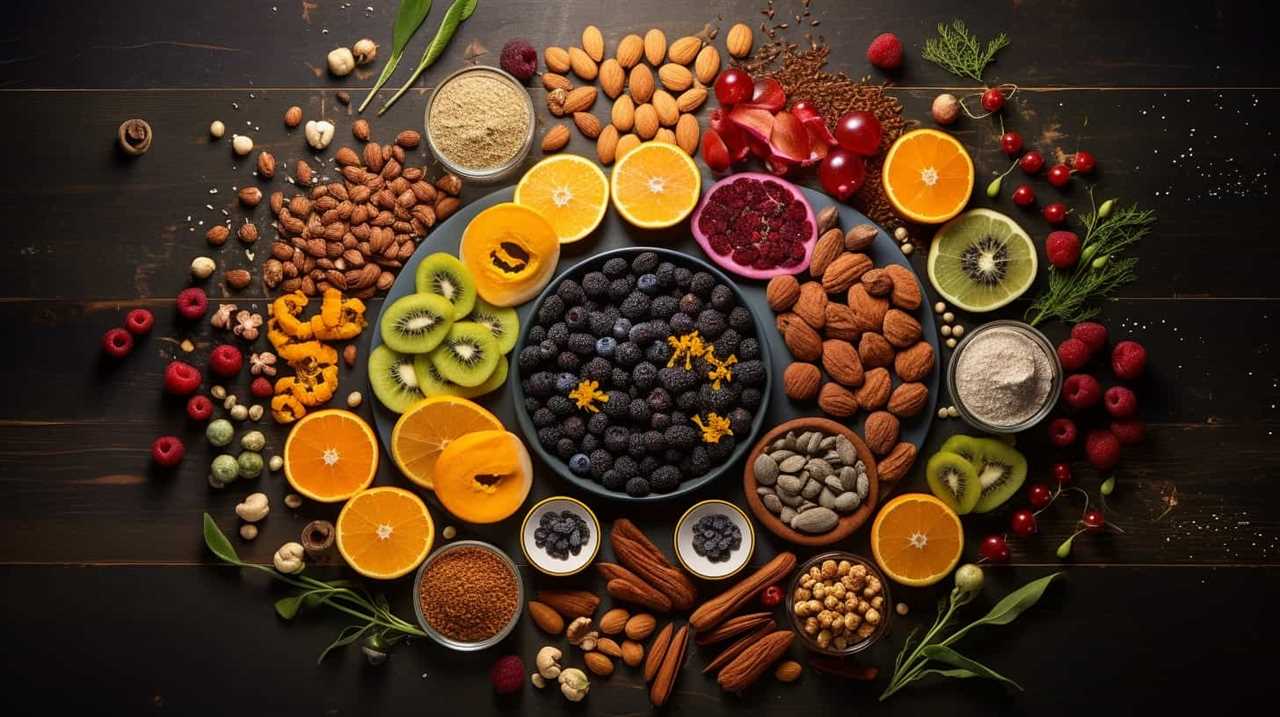
Chia seeds are a versatile ingredient that can easily be incorporated into a variety of dishes to increase their fiber content. Here are some practical ways to use chia seeds in your gluten-free recipes:
- Add chia seeds to salad dressings: By blending chia seeds with your favorite salad dressing ingredients, you can create a delicious and fiber-rich dressing that adds a nutritional boost to your salads.
- Use chia seeds in vegan recipes: Chia seeds can be used as a binding agent in vegan recipes, such as replacing eggs in baking. This not only adds fiber but also provides a healthier alternative to animal products.
- Mix chia seeds into smoothies: Adding chia seeds to your smoothies not only boosts their fiber content but also adds a nice texture and a subtle nutty flavor.
- Sprinkle chia seeds on top of oatmeal or yogurt: This simple addition can significantly increase the fiber content of your breakfast or snack.
- Make chia seed pudding: Chia seeds can absorb liquid and create a pudding-like consistency when mixed with a liquid like almond milk. This makes for a tasty and fiber-packed dessert or breakfast option.
Chia Seeds as a Thickening Agent
One way to utilize chia seeds in gluten-free recipes is by using them as a thickening agent. Chia seeds have a unique ability to absorb liquid and form a gel-like consistency, making them perfect for thickening soups and sauces. Simply sprinkle a tablespoon or two of chia seeds into your soup or sauce while it’s simmering, and watch as they thicken it up to the perfect consistency.
Another great way to incorporate chia seeds as a thickening agent is by adding them to salad dressings. Instead of using traditional thickeners like cornstarch or flour, try whisking in a tablespoon of chia seeds. Not only will they help thicken the dressing, but they’ll also add a boost of nutrition with their omega-3 fatty acids and fiber content.
To summarize, chia seeds can be a versatile and healthy option for thickening soups and salad dressings. Give them a try in your next recipe and enjoy the added nutritional benefits they provide.

| Pros | Cons |
|---|---|
| – Natural thickening agent | – May alter the texture of the dish |
| – Adds nutritional value | – Requires additional stirring to prevent clumping |
| – Gluten-free alternative | – May not work well in all recipes |
Incorporating Chia Seeds in Baked Goods
Let’s explore how to incorporate chia seeds in baked goods for added nutrition and texture. Chia seeds are a versatile ingredient that can be used in various gluten-free recipes, including baked goods. Here are some practical ways to incorporate chia seeds in your baking:
- Add chia seeds to muffins or bread dough for a crunchy texture and a boost of fiber.
- Use chia gel (made by soaking chia seeds in water) as an egg substitute in recipes that call for eggs.
- Sprinkle chia seeds on top of cookies or bars before baking for a delightful crunch.
- Make chia seed crackers by combining chia seeds, water, and gluten-free flour. Roll out the dough, cut into desired shapes, and bake until crispy.
- Blend chia seeds into your favorite gluten-free flour blend for a nutrient-packed flour alternative.
Chia seeds can also be used in salad dressings, adding a thickening and binding effect. Experiment with these ideas to elevate your baked goods with the nutritional benefits of chia seeds.
Chia Seeds in Smoothies and Beverages
When it comes to adding chia seeds to smoothies and beverages, there are two key benefits: hydration and energy.
Chia seeds are known for their ability to absorb liquid, making them an excellent addition to drinks for staying hydrated.

Additionally, these tiny seeds are packed with nutrients like fiber and omega-3 fatty acids, which can provide a natural energy boost.
Chia Seeds for Hydration
We love incorporating a handful of chia seeds into our smoothies and beverages for an extra boost of hydration. Chia seeds aren’t only packed with essential nutrients, but they also have the ability to absorb liquid and create a gel-like substance, which helps to keep us hydrated throughout the day.
Here are a few reasons why chia seeds are great for hydration:
- Rich in electrolytes: Chia seeds contain important electrolytes like potassium, magnesium, and calcium, which are essential for maintaining proper hydration levels.
- High water absorption: Chia seeds can absorb up to 10 times their weight in water, helping to keep us hydrated for longer periods.
- Slow release of hydration: The gel-like consistency created by chia seeds allows for a slow release of hydration, keeping us energized and hydrated throughout the day.
- Promote weight loss: Chia seeds can help with weight loss by promoting a feeling of fullness, which can prevent overeating and aid in maintaining a healthy weight.
- Beneficial for skincare: Chia seeds are rich in antioxidants and omega-3 fatty acids, which can help nourish and hydrate the skin from within.
Chia Seeds for Energy
Continuing from our previous discussion on the benefits of chia seeds, incorporating a handful of these super seeds into our smoothies and beverages provides an energizing boost. Chia seeds are not only packed with nutrients, but they also contain a good amount of healthy fats, fiber, and protein. These properties help to sustain energy levels throughout the day, making them an excellent addition to our diet.

One way to incorporate chia seeds into our drinks is by adding them to smoothies. They blend well and add a slight crunch, enhancing both the texture and nutritional value. Additionally, chia seeds can also be used in homemade beverages, such as chia seed lemonade or infused water.
Here is a table highlighting the benefits of chia seeds in smoothies and beverages:
| Benefits of Chia Seeds in Smoothies and Beverages |
|---|
| Provides sustained energy throughout the day |
| Adds nutritional value to drinks |
| Enhances texture and flavor |
| Supports weight loss |
| Can be used in various beverage recipes |
Moreover, chia seeds can even be incorporated into salad dressings, providing a healthy twist to our favorite greens. So, whether it’s a refreshing smoothie or a revitalizing beverage, chia seeds are a great addition to boost our energy levels and add nutritional value to our diet.
Chia Seeds in Breakfast Recipes
Let’s explore some delicious ways to incorporate chia seeds into your breakfast routine.

One option is to make chia pudding variations by combining chia seeds with your choice of milk, sweetener, and flavorings like vanilla or cocoa powder.
Another idea is to blend chia seeds into smoothies for an extra boost of fiber and omega-3 fatty acids.
Lastly, you can create chia overnight oats by mixing chia seeds with oats, milk, and your favorite toppings for a nutritious and convenient meal.
Chia Pudding Variations
For a delicious and nutritious breakfast option, try incorporating chia seeds into your morning routine with these chia pudding variations. Chia seed pudding recipes aren’t only easy to make but also packed with fiber, protein, and healthy fats.
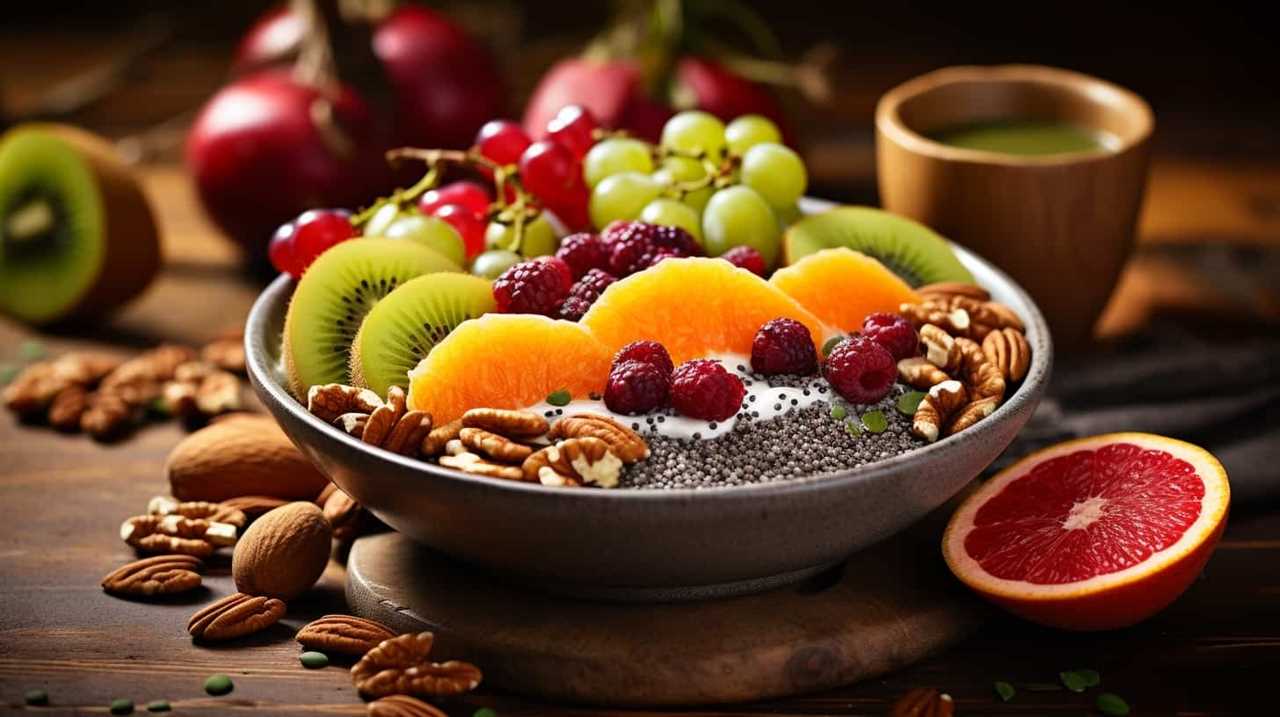
Here are five chia pudding variations to try:
- Vanilla Chia Pudding with Fresh Berries: Mix chia seeds with almond milk, vanilla extract, and a sweetener of your choice. Top it off with fresh berries for a burst of flavor.
- Chocolate Chia Pudding with Almonds: Combine chia seeds, cocoa powder, almond milk, and a touch of sweetener. Sprinkle with chopped almonds for added crunch.
- Matcha Chia Pudding with Coconut Flakes: Whisk together chia seeds, matcha powder, coconut milk, and a sweetener. Garnish with coconut flakes for a tropical twist.
- Peanut Butter Banana Chia Pudding: Blend chia seeds, almond milk, peanut butter, and a ripe banana. Serve with sliced bananas on top for extra creaminess.
- Mango Turmeric Chia Pudding: Mix chia seeds, turmeric powder, mango puree, and coconut milk. Add diced mango for a tropical kick.
These chia pudding variations aren’t only delicious but also provide a nutritious start to your day. Experiment with different flavors and toppings to find your favorite combination.
Chia Seed Smoothies
To continue incorporating chia seeds into our breakfast routine, we can explore the delicious and nutritious option of chia seed smoothies. Chia seeds are a great addition to smoothies as they provide a boost of fiber, protein, and omega-3 fatty acids. They also help to thicken the smoothie and create a creamy texture.
Here is a simple recipe to get you started:

| Ingredients | Instructions |
|---|---|
| 1 cup of almond milk | 1. In a blender, combine all ingredients and blend until smooth. |
| 2 tablespoons of chia seeds | 2. Pour into a glass and let it sit for 10-15 minutes to allow the chia seeds to thicken. |
| 1 ripe banana | 3. Stir well before drinking to evenly distribute the chia seeds. |
| 1 tablespoon of honey | |
| 1 cup of frozen berries |
Feel free to experiment with different fruits, such as mango or pineapple, and add a handful of spinach or kale for an extra nutritional boost. Chia seed smoothies are a quick and easy way to incorporate these super seeds into your breakfast routine.
Keywords: chia seed pudding recipes, chia seed energy bars.
Chia Overnight Oats
Incorporating chia seeds into our breakfast routine, we can enjoy the delicious and nutritious option of chia overnight oats. Chia seeds aren’t only a great source of fiber and omega-3 fatty acids, but they can also aid in weight loss. Here are five reasons why you should try chia overnight oats:
- Chia seeds are a rich source of protein, helping to keep you feeling full and satisfied throughout the morning.
- The high fiber content of chia seeds can promote healthy digestion and prevent overeating.
- Chia seeds have been shown to help regulate blood sugar levels, making them a suitable option for those with diabetes or insulin resistance.
- The omega-3 fatty acids found in chia seeds have anti-inflammatory properties, which can support overall health and wellbeing.
- Chia overnight oats are easy to prepare and can be customized with your favorite toppings and flavors.
Now that we’ve seen the benefits of incorporating chia seeds into our breakfast, let’s dive into how chia seeds are a nutritional powerhouse in other aspects of our diet.
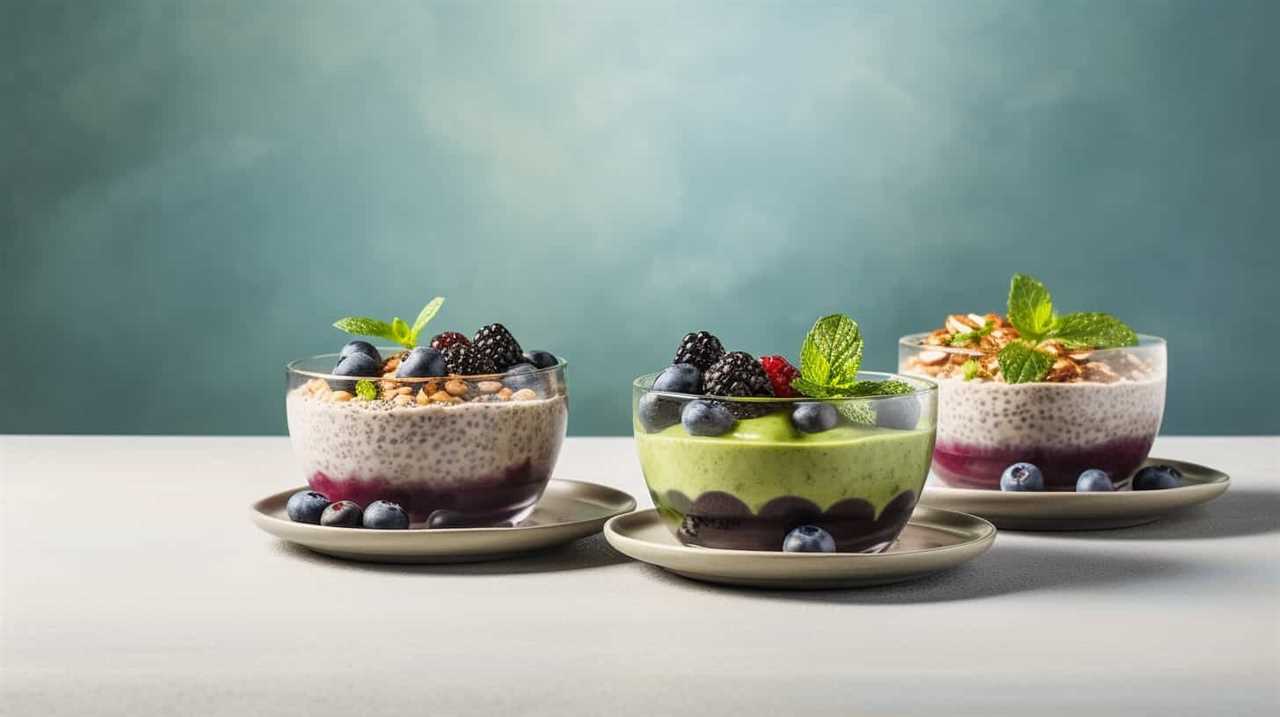
Chia Seeds as a Nutritional Powerhouse
We love using chia seeds as a nutritional powerhouse in our gluten-free recipes. Not only do chia seeds add a delightful crunch and texture, but they also offer numerous health benefits. Chia seeds are rich in fiber, protein, and omega-3 fatty acids, making them a great addition to any diet.
For those looking to lose weight, chia seeds can be a helpful tool. The high fiber content of chia seeds can help you feel fuller for longer, reducing the urge to snack between meals.
Additionally, chia seeds are a wonderful option for those following a vegan diet. They provide essential nutrients like calcium and iron, which can sometimes be lacking in plant-based diets.
Chia Seeds in Savory Dishes
When it comes to incorporating chia seeds into savory dishes, there are several points to consider.
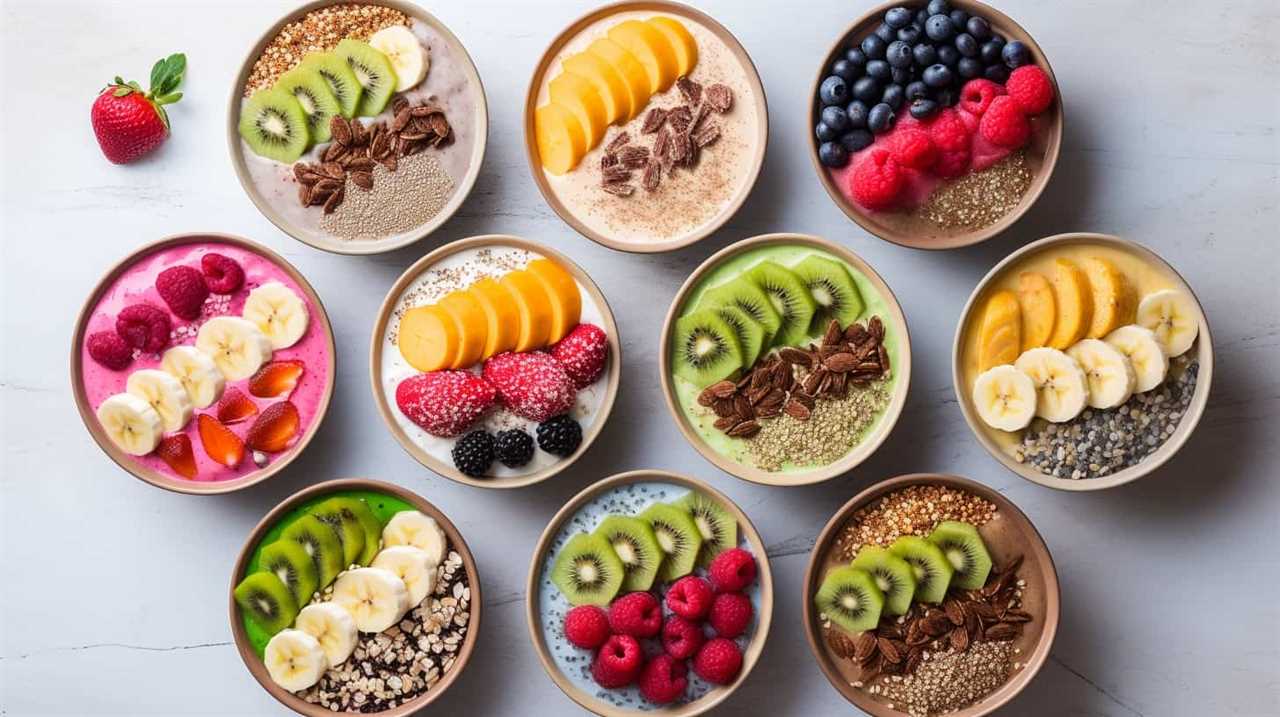
Firstly, chia seeds can act as a flavor enhancer, adding a subtle nutty taste to your meals.
Secondly, they can be used as a main ingredient in dishes like chia seed burgers or chia seed-crusted chicken.
Lastly, chia seeds can provide added texture to savory dishes, whether it’s sprinkled on top of a salad or mixed into a soup or stew.
Chia as Flavor Enhancer
Chia seeds can add a burst of flavor to savory dishes, enhancing their taste and nutritional value. Here are some practical ways to incorporate chia seeds as a flavor enhancer in your favorite savory recipes:

- Sprinkle chia seeds as a salad topping: Add a crunchy texture and nutty flavor to your salads by simply sprinkling chia seeds over the greens. They’ll not only elevate the taste but also provide an extra dose of fiber and omega-3 fatty acids.
- Blend chia seeds into salad dressings: For a creamy and nutritious salad dressing, blend chia seeds with olive oil, vinegar, herbs, and spices. The chia seeds will help thicken the dressing while adding a subtle nuttiness.
- Mix chia seeds into savory sauces: Whether it’s a marinara sauce or a homemade barbecue sauce, mixing chia seeds into the recipe can enhance the flavor and provide a nutrient boost. The chia seeds will absorb some of the liquid, creating a thicker and more flavorful sauce.
- Add chia seeds to savory baked goods: Incorporate chia seeds into your favorite savory baked goods like bread, crackers, or muffins. They can add a unique texture and a mild, nutty flavor to your creations.
- Use chia seeds as a meat or vegetable binder: Chia seeds can act as a binder in recipes that require meat or vegetable patties. They help hold the ingredients together while adding a subtle taste and nutritional benefits.
Chia in Main Courses
Incorporating chia seeds into main courses can elevate the flavor and nutritional profile of your savory dishes. Chia seeds aren’t limited to being used in desserts or smoothies; they can add a crunchy texture and nutty flavor to your salads and other main course recipes.
For a simple and nutritious salad, sprinkle chia seeds over a bed of mixed greens and top with your favorite vegetables and protein. You can also create chia-infused dressings by blending chia seeds with olive oil, lemon juice, garlic, and herbs. The chia seeds will thicken the dressing, giving it a creamy consistency.
These chia-infused dressings can be drizzled over grilled chicken, roasted vegetables, or even used as a dip for raw veggies. By incorporating chia seeds into your main courses, you can enhance both the taste and nutritional value of your meals.
Chia for Added Texture
To continue enhancing the flavor and nutritional value of our savory dishes, let’s explore how chia seeds can be used to add texture and depth to our gluten-free recipes. Chia seeds aren’t only packed with essential nutrients, but they also offer a delightful crunch that can elevate any dish.

Here are some ways you can incorporate chia seeds to add texture:
- Sprinkle chia seeds on top of salads for a satisfying crunch and added fiber.
- Mix chia seeds into salad dressings for a thicker consistency and a boost of omega-3 fatty acids.
- Use chia seeds in breading for a gluten-free alternative that adds a crispy texture to meat and vegetables.
- Blend chia seeds into soups or stews to thicken the broth and create a heartier texture.
- Incorporate chia seeds into homemade veggie burgers or meatballs to add texture and bind the ingredients together.
Now that we’ve explored how chia seeds can enhance our savory dishes, let’s move on to the next section and discover how chia seeds can be a healthy snacking option.
Chia Seeds for Healthy Snacking Options
For those seeking healthy snacking options, incorporating chia seeds into gluten-free recipes can provide numerous benefits.
Chia seeds are packed with essential nutrients like fiber, protein, and omega-3 fatty acids, making them a perfect choice for guilt-free snacking.

These tiny seeds are also known to aid in weight loss due to their ability to absorb liquid and expand in the stomach, helping to promote a feeling of fullness.
Additionally, chia seeds can be sprinkled on top of salads or used in salad dressings to add a crunchy texture and boost the nutritional value of your meal.
Frequently Asked Questions
Are Chia Seeds Safe for People With Nut Allergies?
Chia seeds are safe for people with nut allergies as they are not nuts. However, cross contamination risks may exist. Chia seeds provide nutritional benefits for individuals with nut allergies, such as omega-3 fatty acids and fiber.
Can Chia Seeds Be Used as a Substitute for Other Types of Seeds?
Yes, chia seeds can be used as a substitute for other types of seeds. They have many benefits, such as being a great egg substitute and adding nutritional value to smoothies.
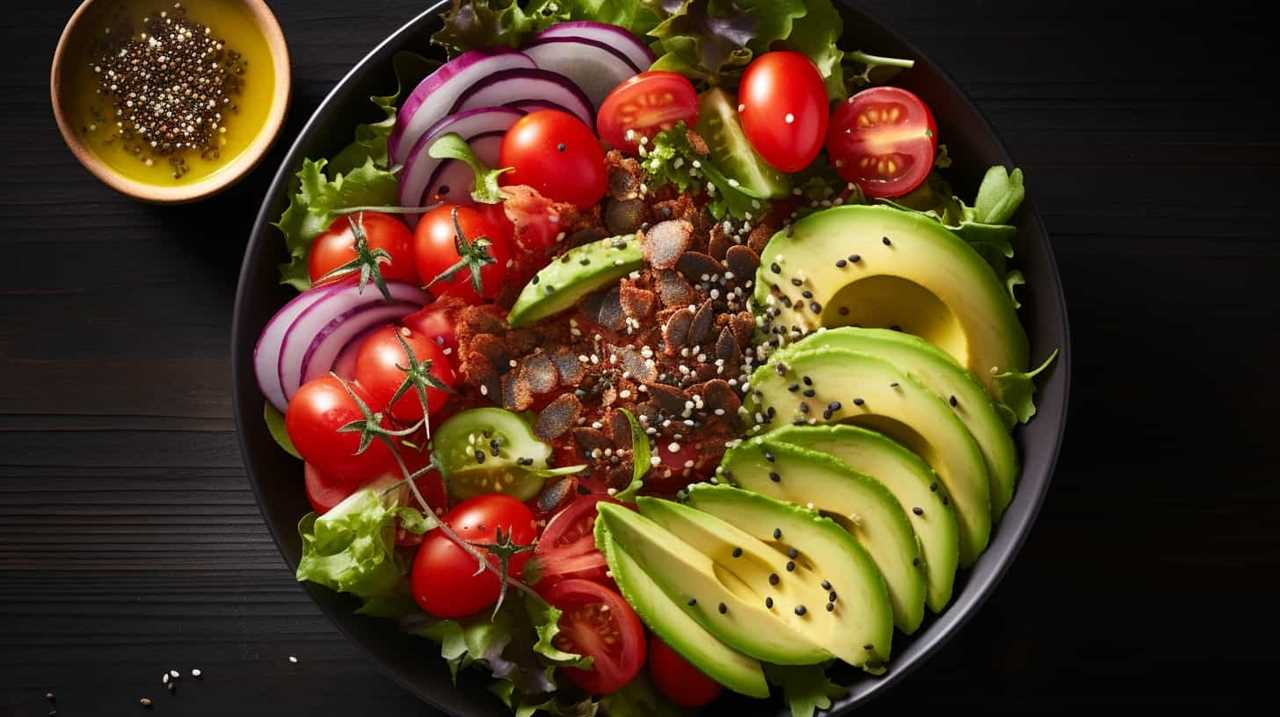
How Can Chia Seeds Be Incorporated Into Gluten-Free Pasta Recipes?
We can incorporate chia seeds into gluten-free pasta recipes by adding them to the sauce or mixing them directly into the pasta dough. Chia seeds also work well in salads and smoothies for added nutrition and texture.
Can Chia Seeds Be Used to Make Gluten-Free Bread?
Yes, chia seeds can be used to make gluten-free bread. They are a great source of fiber, omega-3 fatty acids, and antioxidants. There are many delicious chia seed bread recipes that you can try.
Are There Any Potential Side Effects or Risks Associated With Consuming Chia Seeds?
There are potential side effects of consuming chia seeds, such as digestive issues and blood pressure changes. It is important to be aware of these risks and consider them when incorporating chia seeds into your diet.
Conclusion
Incorporating super seeds like chia in your gluten-free recipes can be a game-changer for your health. These tiny powerhouses are packed with nutrients and offer a range of benefits, from boosting fiber content to serving as a natural egg replacer.
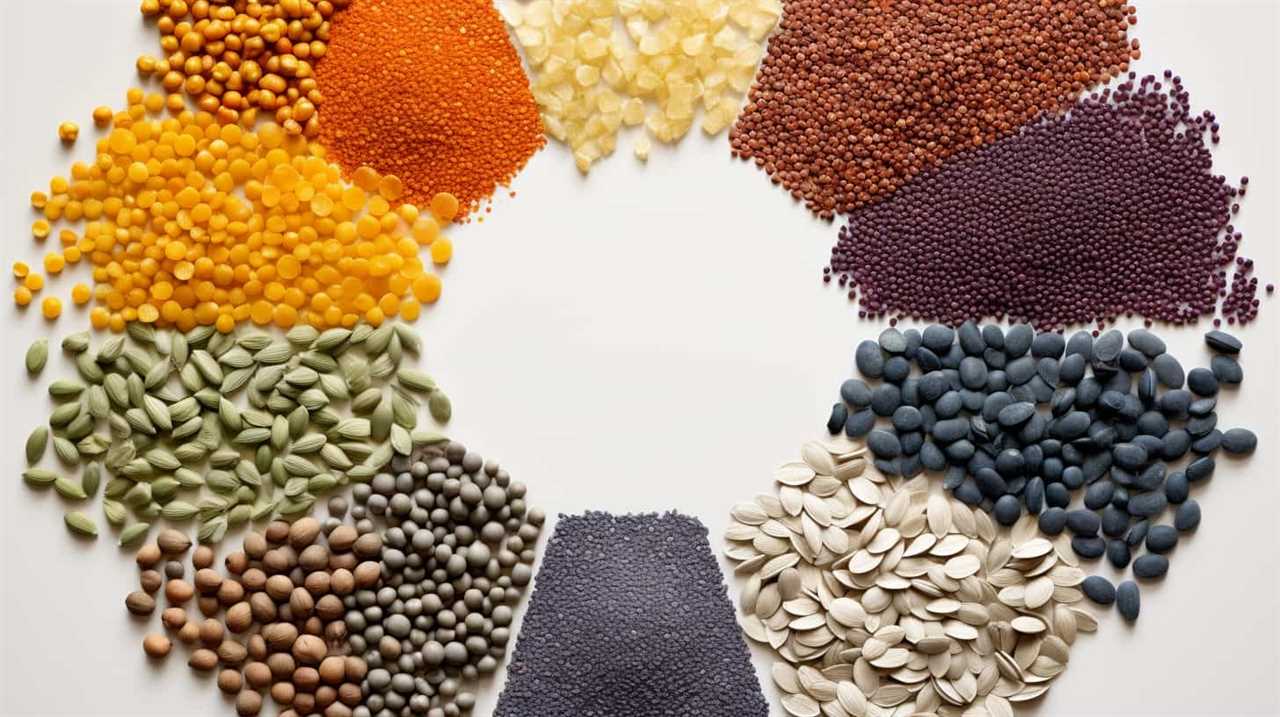
Whether you’re looking to thicken your dishes or add a nutritional punch to your meals, chia seeds are a versatile ingredient that can elevate your gluten-free cooking.
So go ahead and sprinkle some chia magic into your recipes and enjoy the delicious and nutritious results!
Hi, I’m Sarah. I write for Turtle Tree Seeds, a news blog that loves food – all kinds of food. But especially bacon, chocolate, and veggies. We’re on a mission to show the world that you can enjoy all of those things, even kale and brussels sprouts. Because we believe that when it comes to food, there’s no such thing as guilty pleasures. Just pleasures.
I’m also a huge fan of puns (obviously).
Chia Seeds in Gluten-Free Diets
12 Gluten-Free Recipes Featuring Omega-Rich Seeds
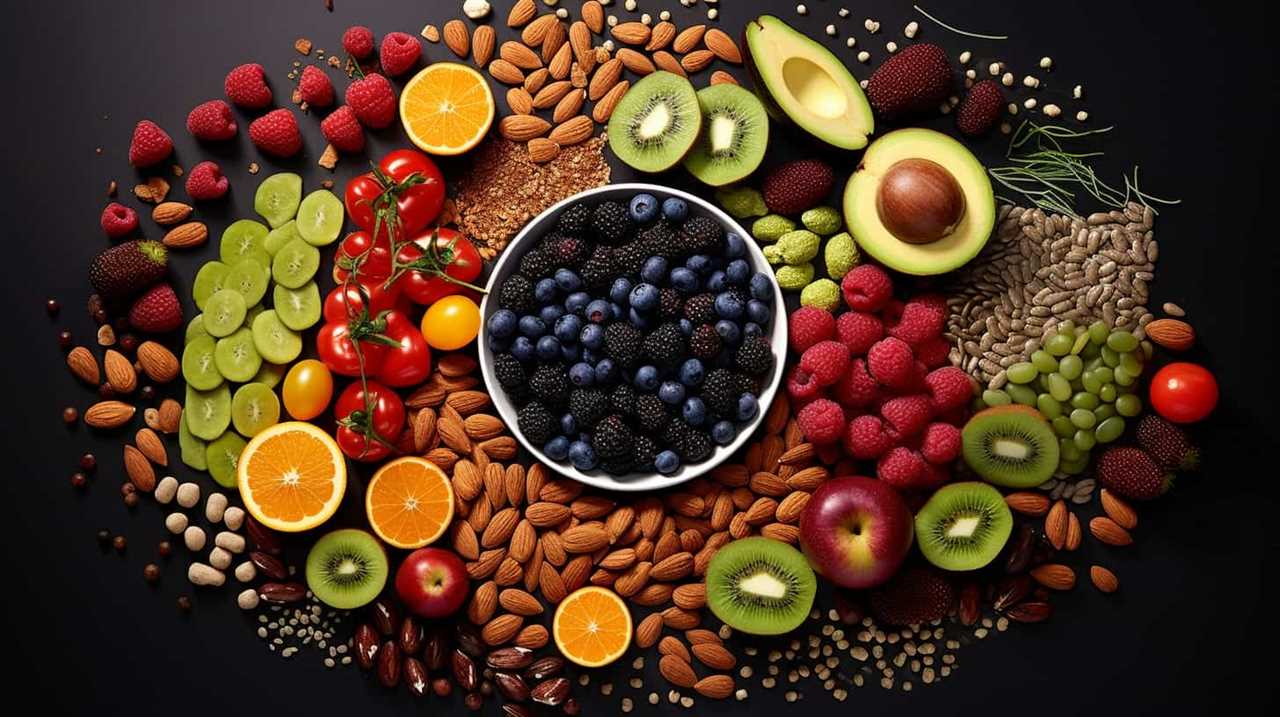
Did you know that incorporating omega-rich seeds into your gluten-free diet can provide numerous health benefits?
We’ve rounded up 12 delicious recipes that feature these power-packed seeds, perfect for breakfast, snacks, salads, smoothies, and even desserts.
From chia seed breakfast bowls to mouthwatering chia seed desserts, these recipes are not only gluten-free but also packed with essential nutrients.
Get ready to indulge in these flavorful creations while nourishing your body with the goodness of omega-rich seeds.
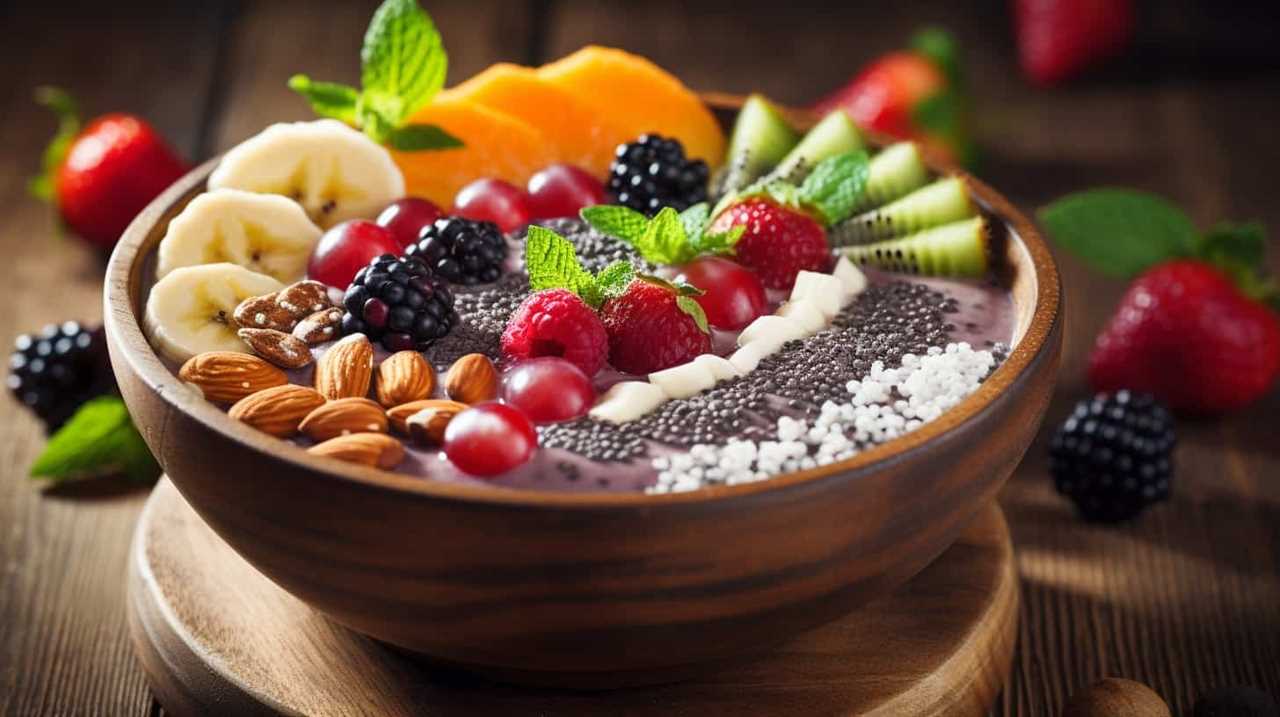
Key Takeaways
- Chia seeds can be incorporated into various breakfast recipes such as chia seed pudding variations, energy bites, smoothies, overnight oats, and pancakes or waffles.
- Chia seeds can be used to create healthy and portable snacks like energy bars, pudding cups, crackers, trail mix, and yogurt parfaits.
- Chia seeds can be added to salads to enhance their nutritional value and texture, with options like Greek chia seed salad, strawberry spinach chia salad, quinoa chia seed salad, Asian chia seed slaw, and chia seed dressing.
- Chia seeds can be used to make delicious and nutritious desserts, including flavored chia seed pudding, chocolate mousse, fruit parfaits, chocolate bark, and fruit crumble.
Chia Seed Breakfast Recipes
In this section, we’ll explore delicious chia seed breakfast recipes that are gluten-free and packed with omega-rich goodness.
Chia seeds are a nutritional powerhouse, rich in fiber, protein, and essential omega-3 fatty acids.
One popular way to enjoy chia seeds for breakfast is by making chia seed pudding variations. Simply combine chia seeds with your choice of milk, sweetener, and flavorings like vanilla or cocoa powder. Let it sit in the fridge overnight, and wake up to a creamy and satisfying pudding that can be topped with fruits, nuts, or granola.
Another quick and easy breakfast idea is chia seed energy bites. These bite-sized treats are made by mixing chia seeds with nut butter, oats, honey, and other ingredients of your choice. They provide a burst of energy and are perfect for on-the-go mornings.
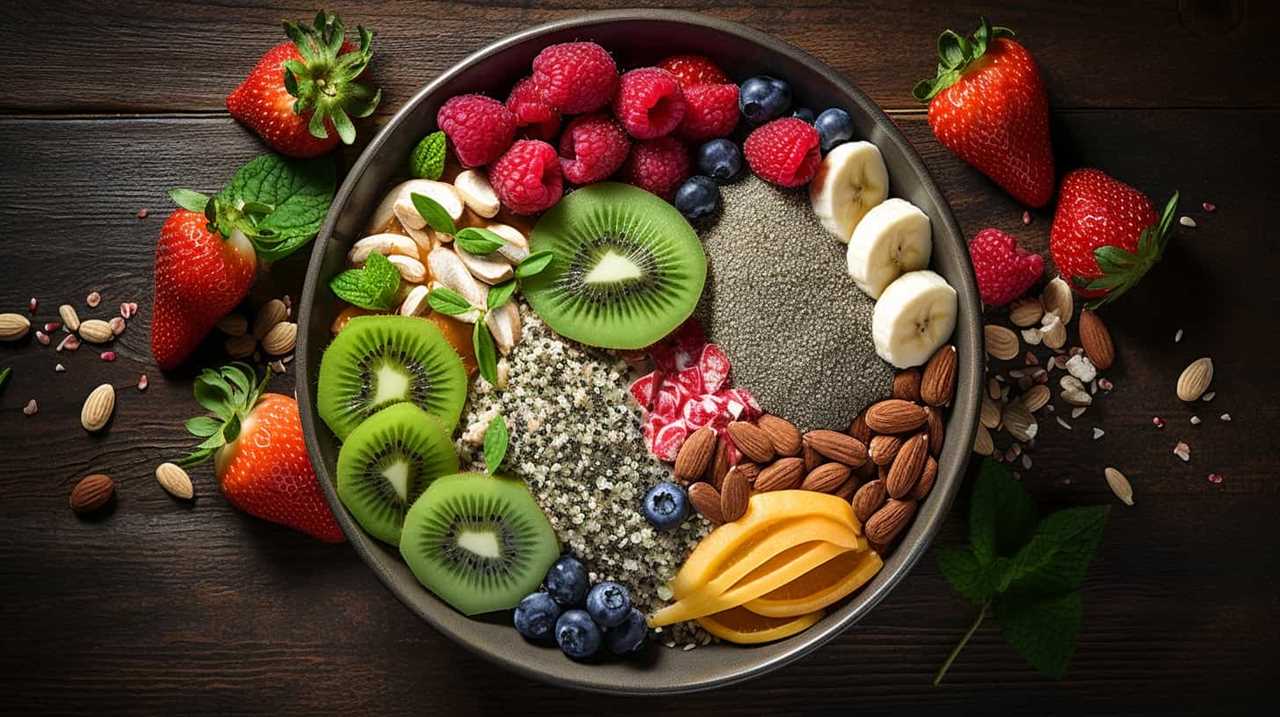
Incorporating chia seeds into your breakfast routine is a simple and delicious way to start your day with a nutritious boost.
Chia Seed Snack Ideas
For our chia seed snack ideas, we have a variety of delicious options that are gluten-free and packed with omega-rich goodness.
Chia seed energy bars are a great choice for a quick and satisfying snack. They’re easy to make and require only a few ingredients like chia seeds, nuts, and dried fruits. Simply mix the ingredients together, press them into a pan, and refrigerate until firm.
Another option is chia seed pudding variations. Chia seeds can absorb liquid and form a gel-like consistency, making them perfect for creating creamy and nutritious puddings. You can experiment with different flavors by adding fruits, nuts, or spices like cinnamon or vanilla extract.
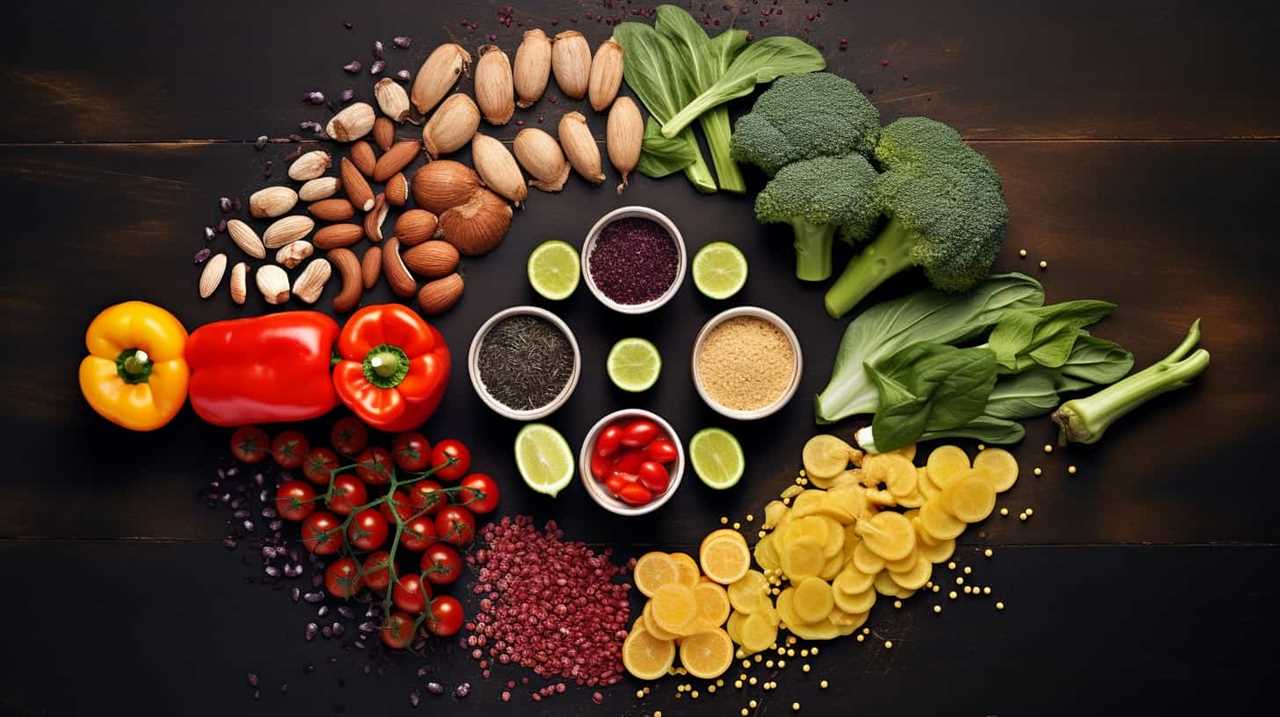
These chia seed snacks aren’t only tasty but also provide a good source of protein, fiber, and healthy fats to keep you energized throughout the day.
Chia Seed Salad Recipes
To continue exploring the versatility of chia seeds, we’ll now delve into the realm of chia seed salad recipes. Chia seeds not only add a delightful crunch to salads but also provide a nutritional boost with their omega-3 fatty acids and fiber content. Here are four delicious chia seed salad recipes to try:
- Greek Chia Seed Salad: Toss together diced cucumbers, cherry tomatoes, red onions, feta cheese, and a sprinkle of chia seeds. Dress with olive oil, lemon juice, and oregano for a refreshing Mediterranean twist.
- Strawberry Spinach Chia Salad: Combine fresh spinach leaves, sliced strawberries, crumbled goat cheese, and chia seeds. Drizzle with a honey mustard vinaigrette for a sweet and tangy flavor.
- Quinoa Chia Seed Salad: Mix cooked quinoa, diced bell peppers, black beans, corn, and chia seeds. Dress with a lime cilantro dressing for a protein-packed and nutritious meal.
- Asian Chia Seed Slaw: Shred cabbage, carrots, and bell peppers. Toss with chia seeds, sesame seeds, and a ginger sesame dressing for a crunchy and flavorful salad.
These chia seed salad recipes aren’t only delicious but also provide a healthy dose of omega-3s and fiber. Enjoy these salads as a light lunch or a side dish to elevate your meals.
Chia Seed Smoothie Recipes
Let’s dive into the world of chia seed smoothie recipes and discover the delicious ways to incorporate these omega-rich seeds into our morning routines. Chia seeds are not only packed with essential nutrients like omega-3 fatty acids, fiber, and antioxidants, but they also add a delightful texture to smoothies. Here are two simple and nutritious chia seed smoothie recipes to kickstart your day:

| Recipe | Ingredients |
|---|---|
| Chia Seed Pudding Smoothie | – 1 ripe banana |
- 1 cup almond milk
- 1 tablespoon chia seeds
- 1 tablespoon honey
- 1/2 teaspoon vanilla extract |
| Chia Seed Energy Booster | – 1 cup spinach - 1/2 cup frozen berries
- 1 tablespoon chia seeds
- 1 tablespoon almond butter
- 1 cup coconut water |
To make these smoothies, simply blend all the ingredients together until smooth and creamy. Feel free to adjust the sweetness or add more liquid if desired. These chia seed smoothies are not only filling and satisfying, but they also provide a nutritious boost to fuel your busy mornings. So, why not give them a try and enjoy the benefits of these omega-rich seeds in a refreshing and delicious way?
Chia Seed Dessert Ideas
We will now explore some delicious chia seed dessert ideas that will satisfy your sweet tooth while providing the health benefits of these omega-rich seeds. Chia seeds aren’t only packed with nutrients, but they also add a delightful texture to desserts.
Here are four mouthwatering chia seed dessert recipes to try:
- Chia Seed Pudding: Mix chia seeds with your choice of milk, sweetener, and flavorings like vanilla or cocoa powder. Let it sit in the fridge overnight, and in the morning, you’ll have a creamy and satisfying pudding.
- Chia Seed Energy Balls: Combine chia seeds with dates, nuts, and your favorite add-ins like coconut flakes or chocolate chips. Roll them into bite-sized balls, and they make a perfect on-the-go snack or healthy dessert option.
- Chia Seed Yogurt Parfait: Layer chia seed pudding with Greek yogurt and fresh fruits for a refreshing and nutritious dessert. Top it off with some granola for an added crunch.
- Chia Seed Chocolate Mousse: Blend chia seeds with avocado, cocoa powder, and sweetener of your choice. The result is a rich and velvety chocolate mousse that’s both decadent and healthy.
These chia seed dessert ideas aren’t only delicious but also a great way to incorporate omega-rich seeds into your diet. Enjoy these sweet treats guilt-free!
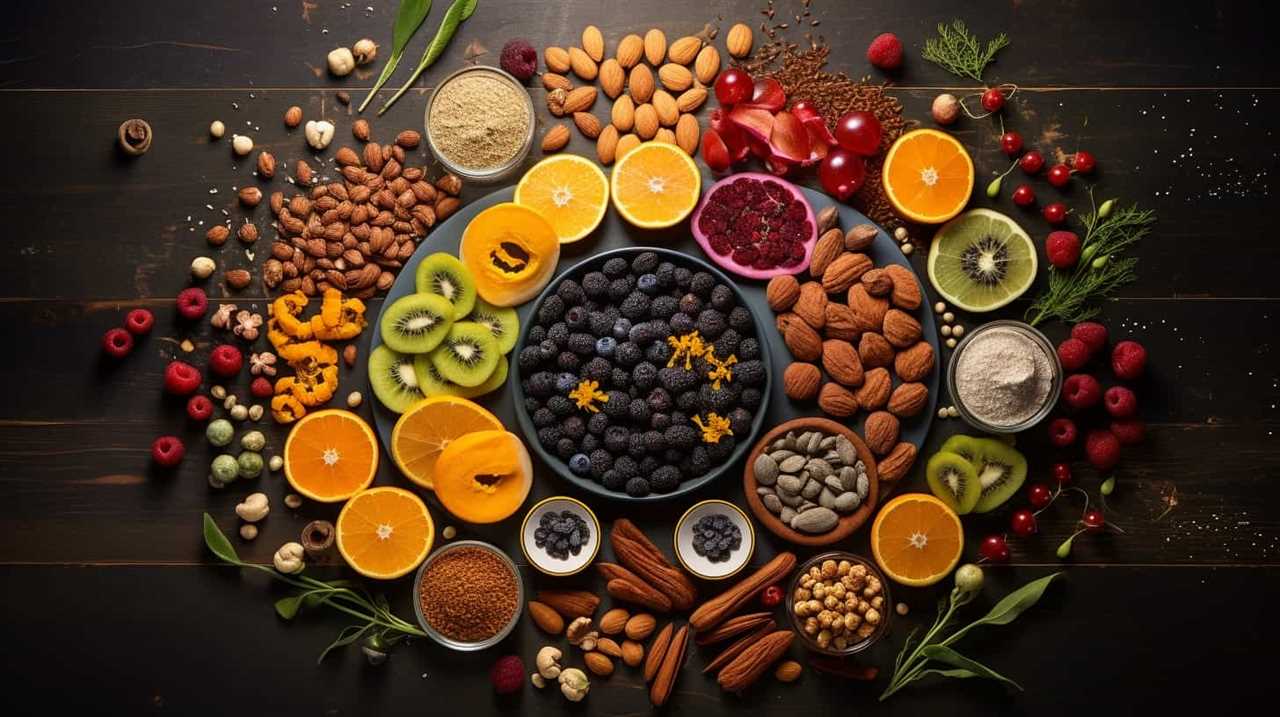
Frequently Asked Questions
Are Chia Seeds Safe for People With Gluten Intolerance or Celiac Disease?
Chia seeds are safe for people with gluten intolerance or celiac disease. They are gluten-free and can be used as a baking substitute. Additionally, chia seeds support gut health due to their fiber content.
Can Chia Seeds Help With Weight Loss?
Chia seeds can help with weight loss by aiding digestion and boosting energy levels. They are packed with fiber, which promotes satiety, and contain essential nutrients that support a healthy metabolism.
How Can I Incorporate Chia Seeds Into My Daily Diet?
Incorporating chia seeds into smoothies, baking, and salads is a great way to boost your daily intake of omega-rich seeds. Try chia seed pudding recipes for a nutritious and delicious treat.
What Are the Health Benefits of Consuming Chia Seeds?
Chia seeds offer numerous health benefits, such as being a natural energy booster and providing essential nutrients. However, there are challenges in growing them commercially. Including chia seeds in gluten-free recipes can enhance their omega-rich content.
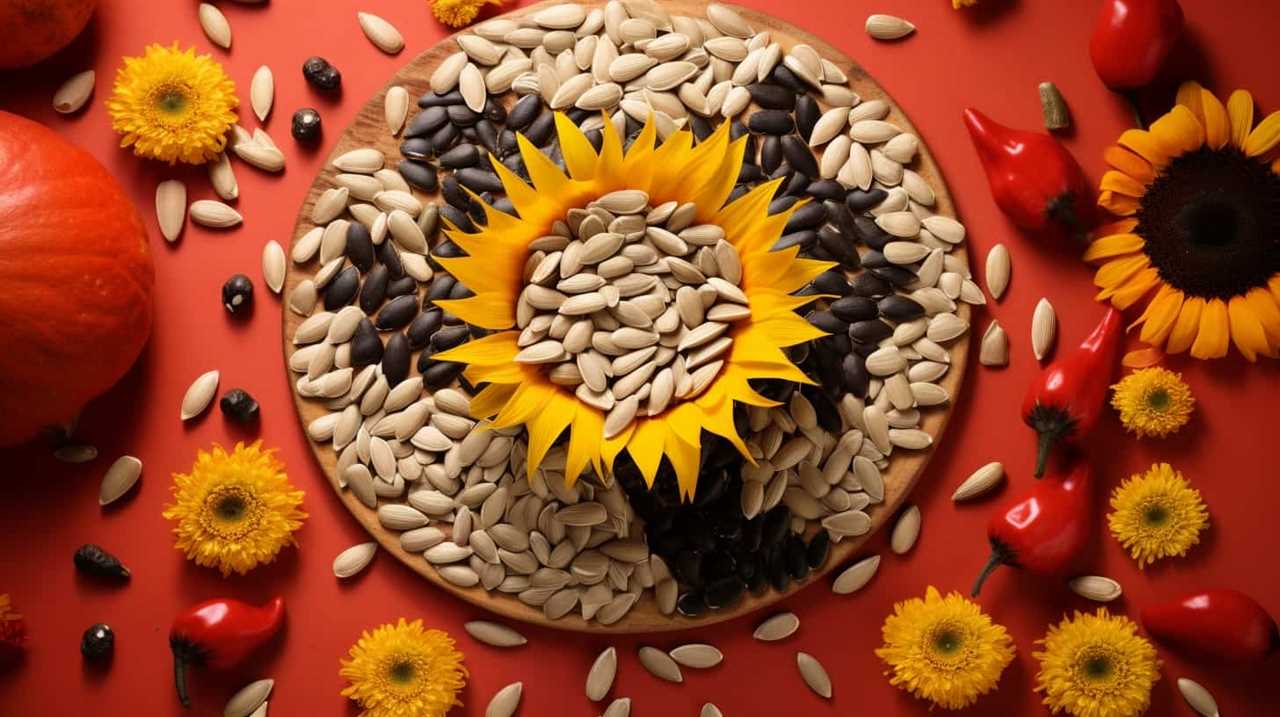
Are There Any Potential Side Effects or Risks Associated With Consuming Chia Seeds?
There are potential side effects and risks associated with consuming chia seeds. These may include digestive issues, allergies, and interactions with medications. It’s important to consult a healthcare professional before incorporating chia seeds into your diet.
Conclusion
Incorporating omega-rich seeds like chia into your gluten-free diet can provide numerous health benefits.
Did you know that chia seeds contain five times more calcium than milk?
This statistic highlights the importance of including these seeds in your meals, not only for those with gluten sensitivities but for anyone looking to boost their nutrient intake.
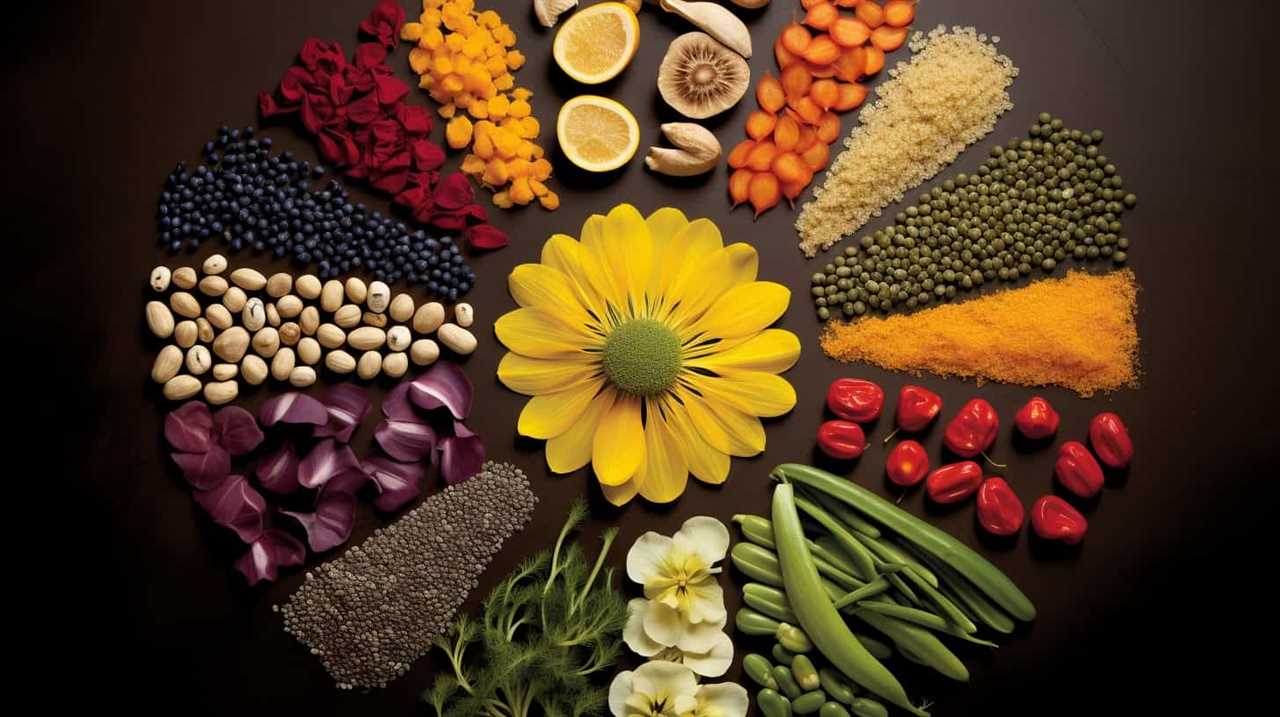
So go ahead and try out some of these delicious and nutritious gluten-free recipes featuring chia seeds today!
Hi, I’m Sarah. I write for Turtle Tree Seeds, a news blog that loves food – all kinds of food. But especially bacon, chocolate, and veggies. We’re on a mission to show the world that you can enjoy all of those things, even kale and brussels sprouts. Because we believe that when it comes to food, there’s no such thing as guilty pleasures. Just pleasures.
I’m also a huge fan of puns (obviously).
Chia Seeds in Gluten-Free Diets
12 Tips: Maximizing Nutrition in Gluten-Free Diets With Seeds

Exciting news for those who follow a gluten-free lifestyle! Did you know that incorporating seeds into your meals can greatly boost their nutritional content?
In fact, we’ve compiled 12 tips to help you make the most of your gluten-free diet with the power of seeds. From chia seeds packed with omega-3 fatty acids to boosting fiber intake and enhancing digestive health, this article will provide evidence-based tips to help you nourish your body.
So let’s dive in and discover how seeds can elevate your gluten-free journey!
Key Takeaways
- Chia seeds are packed with essential nutrients like fiber, protein, omega-3 fatty acids, antioxidants, calcium, magnesium, and iron.
- Chia seeds have a higher antioxidant content compared to flaxseeds and pumpkin seeds.
- Chia seeds can be easily incorporated into daily meals to maximize nutrition.
- Including chia seeds in gluten-free baking boosts the fiber content of recipes.
Importance of Chia Seeds in Gluten-Free Diets
One of the key benefits of chia seeds in our gluten-free diets is their high content of essential nutrients. Chia seeds are a powerhouse of nutrition, packed with fiber, protein, omega-3 fatty acids, antioxidants, and minerals like calcium, magnesium, and iron.
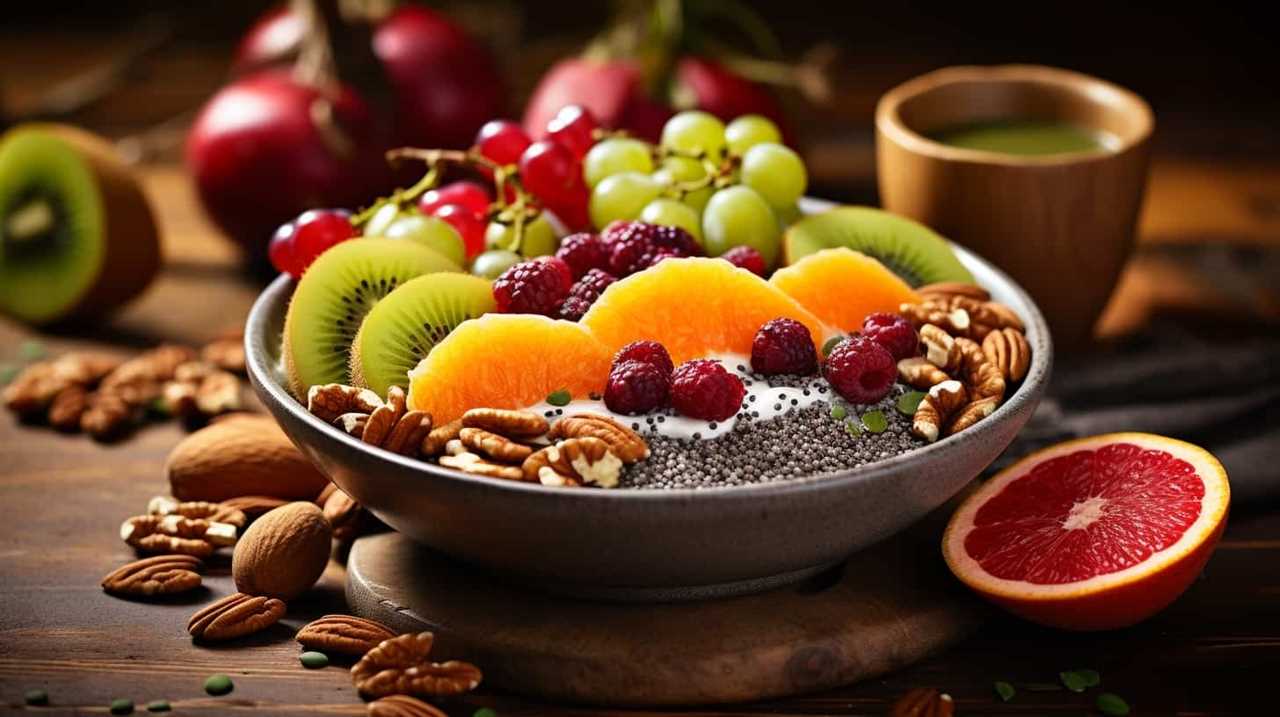
Incorporating chia seeds into our gluten-free recipes not only adds a delightful crunch but also boosts the nutritional value of our meals. These tiny seeds can be used in various ways, such as adding them to smoothies, puddings, or baked goods. Chia seed recipes are versatile and offer a wide range of options to suit different tastes and dietary preferences.
Nutritional Benefits of Chia Seeds
Now let’s delve into the impressive nutritional benefits that chia seeds offer in our gluten-free diets. Chia seeds are a powerhouse of nutrients, packed with fiber, protein, and healthy fats. They are also rich in essential vitamins and minerals like calcium, magnesium, and iron. These tiny seeds are known for their high antioxidant content, which helps protect our bodies from oxidative stress and inflammation.
Incorporating chia seeds into gluten-free baking is a great way to boost the nutritional value of your recipes. They can be used as an egg substitute, providing a binding agent that works well in baked goods. Chia seeds also add a delightful crunch and nutty flavor to your creations.
Here’s a handy table highlighting some of the key nutritional properties of chia seeds:
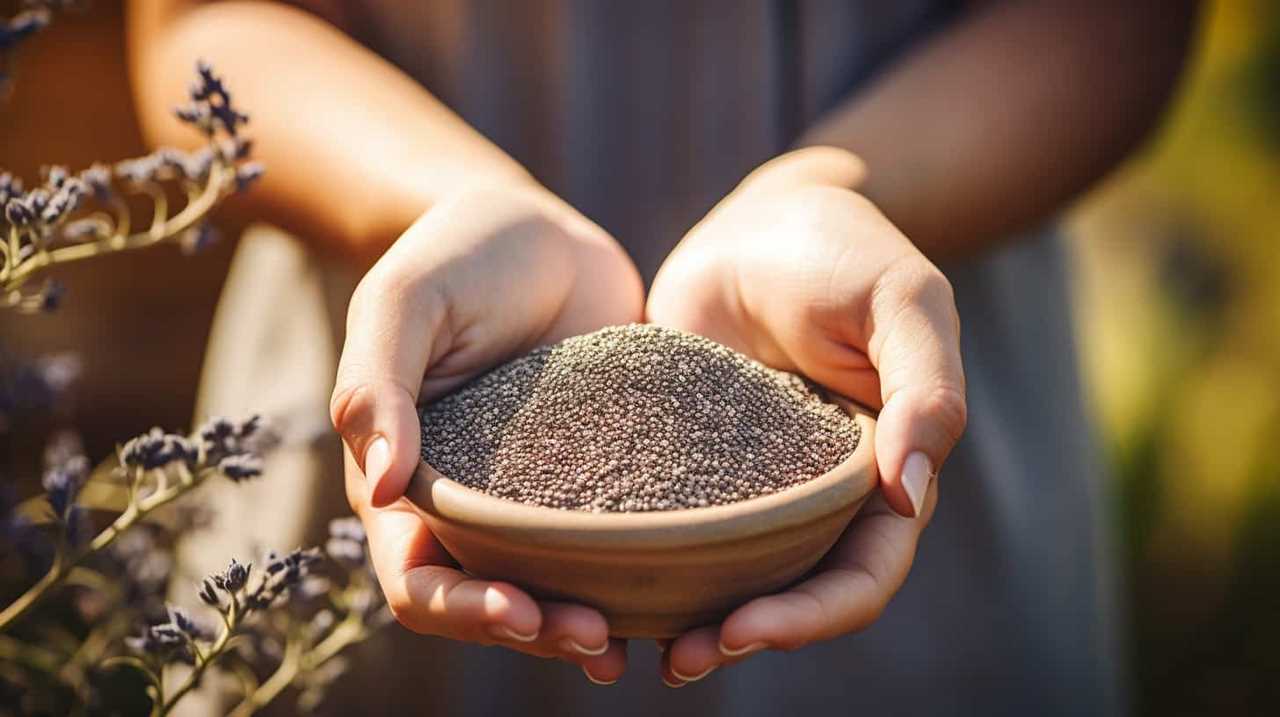
| Nutrient | Amount per 1 ounce (28 grams) |
|---|---|
| Fiber | 11 grams |
| Protein | 4 grams |
| Omega-3 Fatty Acids | 5 grams |
| Calcium | 18% of the Daily Value |
| Iron | 12% of the Daily Value |
Incorporating chia seeds into your gluten-free diet not only adds a nutritional boost but also enhances the taste and texture of your meals. So go ahead, sprinkle some chia seeds on your salads, yogurt, or smoothies, and reap the many benefits they have to offer.
Incorporating Chia Seeds in Everyday Meals
Let’s explore the various health benefits of chia seeds. Chia seeds are packed with nutrients like fiber, omega-3 fatty acids, and antioxidants, making them a great addition to our diet.
Discover creative recipes to incorporate them into our everyday meals. We can experiment with chia seed pudding, sprinkle them on top of salads or yogurt, or use them as an egg substitute in baking.
Learn how they can be used as substitutes in gluten-free diets. With their versatility and nutritional value, chia seeds can be easily incorporated into our daily meals to maximize the nutrition in our gluten-free diets.
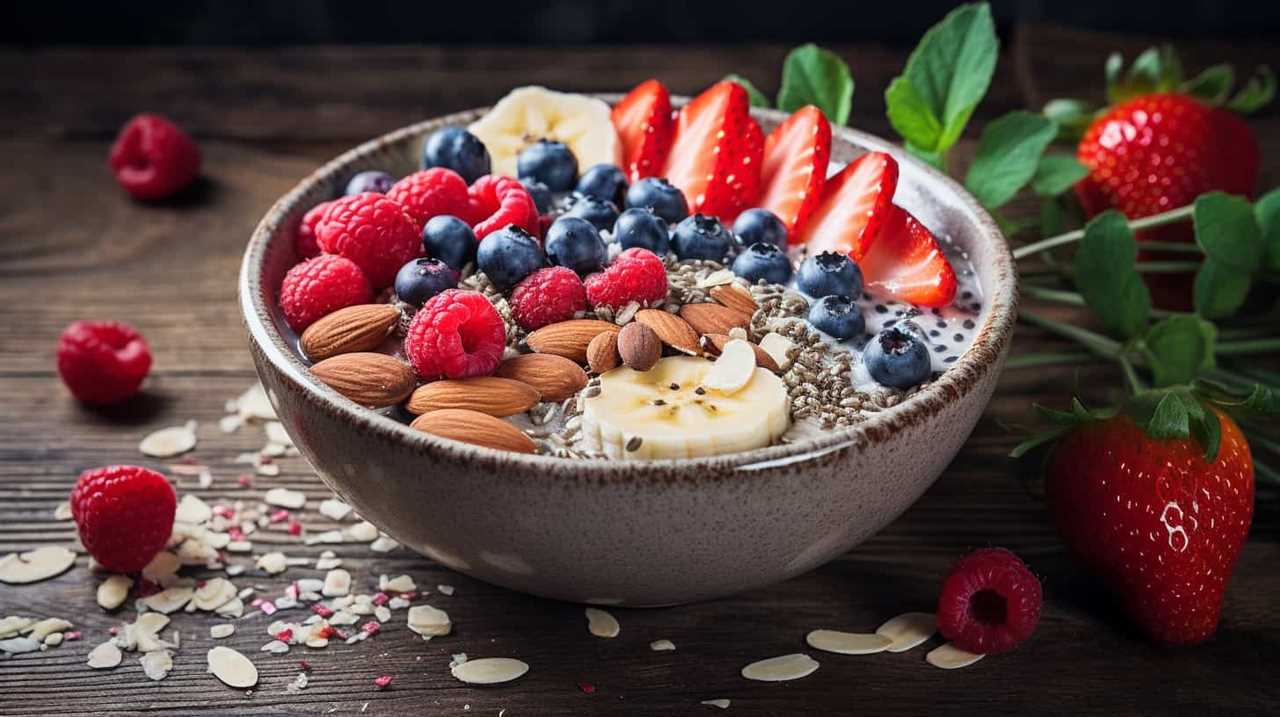
Chia Seed Health Benefits
We love incorporating chia seeds in our everyday meals to take advantage of their numerous health benefits. Chia seeds are packed with nutrients and can easily be added to a variety of dishes. Here are some ways to incorporate chia seeds into your meals:
- Chia seed recipes:
- Add chia seeds to your smoothies for an extra boost of fiber and omega-3 fatty acids.
- Sprinkle chia seeds on top of your yogurt or oatmeal for added texture and nutrition.
- Chia seed pudding:
- Make a delicious chia seed pudding by combining chia seeds with your choice of milk and sweetener. Let it sit overnight in the refrigerator, and enjoy a nutritious and satisfying dessert or snack.
Chia seeds are a great addition to any diet, as they provide essential nutrients and can easily be incorporated into your favorite meals. So go ahead and start reaping the health benefits of chia seeds today!
Creative Chia Seed Recipes
For maximum nutrition in gluten-free diets, we can explore a multitude of creative chia seed recipes that incorporate these nutrient-rich seeds into our everyday meals. Chia seeds are incredibly versatile and can be easily incorporated into various dishes, adding a nutritional boost to our diets.
One popular way to include chia seeds in our meals is by making chia seed smoothies. Simply blend together your favorite fruits, a liquid of your choice (such as almond milk or coconut water), and a tablespoon or two of chia seeds. This won’t only add a subtle nutty flavor but also provide a good dose of omega-3 fatty acids, fiber, and protein.

Another delicious option is chia seed pudding. Mix chia seeds with a liquid like coconut milk or yogurt, sweeten with honey or maple syrup, and let it sit in the refrigerator overnight. The result is a thick and creamy pudding that can be enjoyed as a healthy dessert or even as a breakfast option.
By incorporating chia seeds into our everyday meals through recipes like chia seed smoothies and chia seed pudding, we can maximize the nutrition in our gluten-free diets.
Now, let’s explore how chia seeds can be used as substitutes in various recipes.
Chia Seeds as Substitutes
To incorporate chia seeds into our everyday meals, we can explore using them as substitutes in various recipes, adding a nutritious twist to our gluten-free diets. Chia seeds are incredibly versatile and can be incorporated into a wide range of dishes. Here are two ideas to get you started:

- Chia Seed Pudding: Replace traditional pudding ingredients with chia seeds for a healthier alternative. Simply mix chia seeds with your choice of dairy or plant-based milk, sweetener, and flavorings such as vanilla or cocoa powder. Let it sit in the refrigerator overnight, and in the morning, you’ll have a delicious and nutritious pudding.
- Chia Seed Smoothies: Add a tablespoon or two of chia seeds to your favorite smoothie recipe. Not only will it add a boost of nutrition, but it will also help thicken the smoothie and keep you feeling full for longer.
Boosting Fiber Intake With Chia Seeds
To increase our fiber intake, we can incorporate chia seeds into our gluten-free diets. Chia seeds are a great source of fiber, with just one ounce providing a whopping 11 grams. Fiber is essential for promoting healthy digestion and regulating blood sugar levels. By adding chia seeds to our meals, we can boost our fiber intake and support overall gut health.
One way to incorporate chia seeds is by adding them to smoothies. Simply blend a tablespoon or two of chia seeds into your favorite smoothie recipe for an extra fiber boost. The chia seeds will also add a nice texture and help thicken the smoothie.
In the next section, we’ll explore how chia seeds can enhance our omega-3 fatty acid intake, further maximizing the nutritional benefits of our gluten-free diets.
Enhancing Omega-3 Fatty Acid Intake With Chia Seeds
Let’s explore how we can boost our omega-3 fatty acid intake by incorporating chia seeds into our gluten-free diets. Chia seeds are an excellent source of omega-3 fatty acids, which offer numerous health benefits.

Here are two ways we can incorporate chia seeds into our daily routine:
- Add chia seeds to smoothies: Chia seeds can be easily added to your favorite smoothie recipes. Simply sprinkle a tablespoon or two of chia seeds into your blender along with fruits, vegetables, and other ingredients. This won’t only enhance the nutritional value of your smoothie but also provide a good dose of omega-3 fatty acids.
- Make chia seed puddings: Chia seed puddings are a delicious and nutritious way to incorporate chia seeds into your diet. Mix chia seeds with your choice of milk, sweetener, and flavorings, and let it sit in the refrigerator overnight. The chia seeds will absorb the liquid and form a creamy texture, perfect for a healthy and satisfying dessert.
Incorporating chia seeds into our smoothies and recipes can help us maximize our omega-3 fatty acid intake and enjoy the many benefits they offer.
Chia Seeds as a Source of Antioxidants
Chia seeds aren’t only rich in omega-3 fatty acids but also serve as a great source of antioxidants.
Antioxidants play a crucial role in protecting our cells from damage caused by free radicals, which are known to contribute to chronic diseases and aging.

Incorporating chia seeds into a gluten-free diet can provide an additional boost of antioxidants, further enhancing the nutritional benefits of this versatile seed.
Chia Seeds and Antioxidants
As we explore the benefits of chia seeds in maximizing nutrition in gluten-free diets, it’s important to highlight their role as a rich source of antioxidants. Antioxidants are compounds that protect our cells from damage caused by harmful molecules called free radicals.
Chia seeds are packed with antioxidants, making them an excellent addition to any diet. Here are two reasons why chia seeds are a great source of antioxidants:
- Chia seeds contain high levels of polyphenols, which are plant compounds known for their antioxidant properties. These polyphenols help to reduce inflammation in the body and protect against chronic diseases.
- Chia seeds are also rich in vitamin E, another powerful antioxidant. Vitamin E helps to protect our cells from oxidative stress and supports a healthy immune system.
By incorporating chia seeds into your diet, you can boost your antioxidant intake and support overall health and well-being.

Now, let’s delve into the nutritional benefits of chia seeds.
Nutritional Benefits of Chia
Continuing our exploration of maximizing nutrition in gluten-free diets with seeds, it is important to highlight the nutritional benefits of chia seeds, particularly as a source of antioxidants. Chia seeds are tiny black seeds that pack a powerful punch when it comes to nutrition. One of their standout features is their high antioxidant content, which can help protect our cells from damage caused by free radicals. Antioxidants are compounds that neutralize these harmful molecules and reduce the risk of chronic diseases such as heart disease and cancer.
To further illustrate the nutritional benefits of chia seeds, here is a table that compares their antioxidant content to other common seeds:
| Seed Type | Antioxidant Content (per 1 oz) |
|---|---|
| Chia Seeds | 4,870 ORAC units |
| Flaxseeds | 1,800 ORAC units |
| Pumpkin Seeds | 1,400 ORAC units |
As you can see, chia seeds are a standout choice for those looking to increase their antioxidant intake. Incorporating chia seeds into your diet is not only a delicious and versatile option, but it can also contribute to heart health by reducing oxidative stress and inflammation. To reap the benefits, try adding chia seeds to smoothies, yogurt, oatmeal, or even baking them into healthy treats.

Managing Blood Sugar Levels With Chia Seeds
By incorporating chia seeds into our gluten-free diets, we can effectively manage blood sugar levels. Chia seeds are a great addition to a diabetes management plan because they have a low glycemic index and are rich in fiber and protein. Here are two ways chia seeds can help manage blood sugar levels:
- Regulating blood sugar: Chia seeds form a gel-like substance when mixed with liquid, which slows down the digestion and absorption of carbohydrates. This helps prevent spikes in blood sugar levels after meals.
- Increasing insulin sensitivity: Chia seeds are packed with omega-3 fatty acids, which have been shown to improve insulin sensitivity. By enhancing the body’s response to insulin, chia seeds can help regulate blood sugar levels more efficiently.
Incorporating chia seeds into our gluten-free diets can be a simple and effective way to manage blood sugar levels and support overall health.
Chia Seeds for Weight Management in Gluten-Free Diets
When it comes to weight management in gluten-free diets, chia seeds can be a valuable addition. Chia seeds are known for their ability to promote satiety, helping to curb cravings and overeating.
Additionally, these seeds are rich in fiber, which aids in digestion and can contribute to a healthy weight.

Chia Seeds for Satiety
Using chia seeds for weight management in gluten-free diets involves incorporating them into our meals and snacks. Chia seeds are an excellent addition to a gluten-free diet due to their satiety benefits and versatility in recipes. Here are some ways chia seeds can help with weight management:
- Chia seeds are rich in fiber, which can help promote feelings of fullness and reduce overeating.
- When mixed with liquid, chia seeds form a gel-like substance that expands in the stomach, further enhancing satiety.
- Chia seeds can be added to smoothies, yogurt, oatmeal, or baked goods for an extra boost of nutrition and to increase the feeling of fullness.
Incorporating chia seeds into our gluten-free meals and snacks not only provides us with essential nutrients but also helps us stay satisfied for longer, aiding in weight management.
Now, let’s explore how chia seeds can benefit digestion.
Chia Seeds for Digestion
To continue maximizing nutrition in gluten-free diets with seeds, let’s explore the benefits of incorporating chia seeds for digestion and weight management.

Chia seeds are a powerhouse of nutrients that can support a healthy digestive system and aid in weight management. These tiny seeds are packed with fiber, which promotes regular bowel movements and helps prevent constipation.
Additionally, the high fiber content of chia seeds helps you feel fuller for longer, which can be helpful for weight management. Chia seeds also provide a good source of energy, thanks to their high omega-3 fatty acid content.
Moreover, chia seeds are excellent for hydration as they can absorb up to 10 times their weight in water, helping to maintain proper hydration levels in the body.
Chia Seeds as a Plant-Based Protein Source
Chia seeds provide a valuable plant-based protein source for individuals following a gluten-free diet. They’re an excellent alternative protein option for those who can’t consume gluten or choose to follow a plant-based diet.

Here are some reasons why chia seeds are a great choice for plant-based protein:
- High protein content: Chia seeds are packed with protein, containing about 14% protein by weight. This makes them an excellent plant-based protein source to incorporate into your diet.
- Complete protein: Chia seeds contain all essential amino acids, making them a complete protein source. This is important as it ensures that your body gets all the necessary building blocks for overall health and well-being.
- Easy to digest: Unlike some other plant-based protein sources, chia seeds are easily digestible. This means that your body can efficiently absorb and utilize the protein they provide.
- Versatile and easy to incorporate: Chia seeds can be added to a variety of dishes, such as smoothies, yogurt, oatmeal, and baked goods. They can also be used as an egg substitute in recipes, making them a versatile ingredient in gluten-free cooking.
Maximizing Calcium Intake With Chia Seeds
How can we ensure that our gluten-free diet includes an adequate intake of calcium? Maximizing calcium absorption is crucial for maintaining strong bones and overall bone health. Chia seeds can be a great addition to our diet in order to achieve this goal.
Chia seeds are rich in calcium, with just one ounce providing about 18% of the recommended daily intake. Additionally, chia seeds contain other nutrients like magnesium and phosphorus, which are important for bone health as well. To maximize the absorption of calcium from chia seeds, it’s recommended to consume them ground or soaked. This helps to break down the seeds and release their nutrients for better absorption in our bodies.
Incorporating chia seeds into our gluten-free diet is a simple and effective way to ensure we’re getting enough calcium for strong and healthy bones.
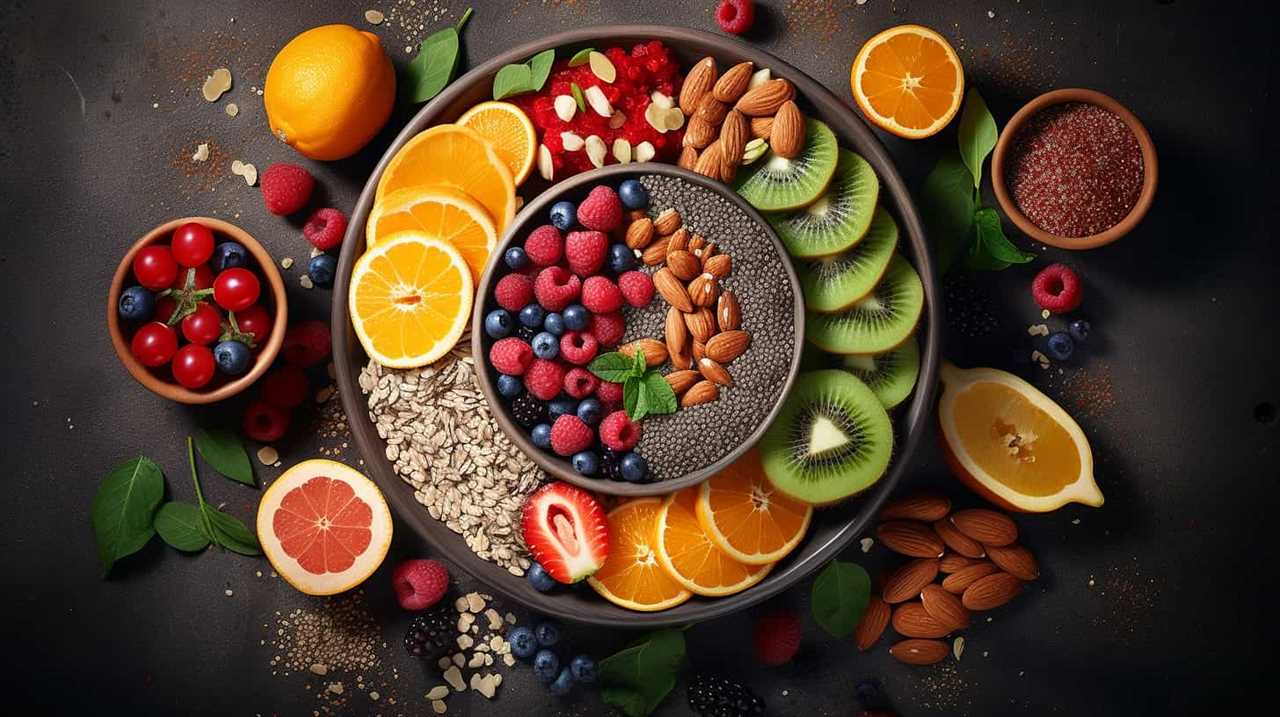
As we’ve seen, chia seeds aren’t only beneficial for maximizing calcium intake, but they also offer several advantages for digestive health. Let’s explore how chia seeds can improve our digestive system and support overall gut health.
Chia Seeds for Improved Digestive Health
Incorporating chia seeds into our gluten-free diet can also contribute to improved digestive health and support overall gut health.
Here’s how chia seeds can help in promoting regularity and improving gut health:
- Chia seeds are rich in dietary fiber, which adds bulk to the stool and helps prevent constipation. This can aid in promoting regular bowel movements.
- The soluble fiber in chia seeds acts as a prebiotic, providing nourishment for the beneficial bacteria in our gut. This can help maintain a healthy balance of gut flora and support overall gut health.
By including chia seeds in our gluten-free diet, we can improve our digestive health and promote regularity.
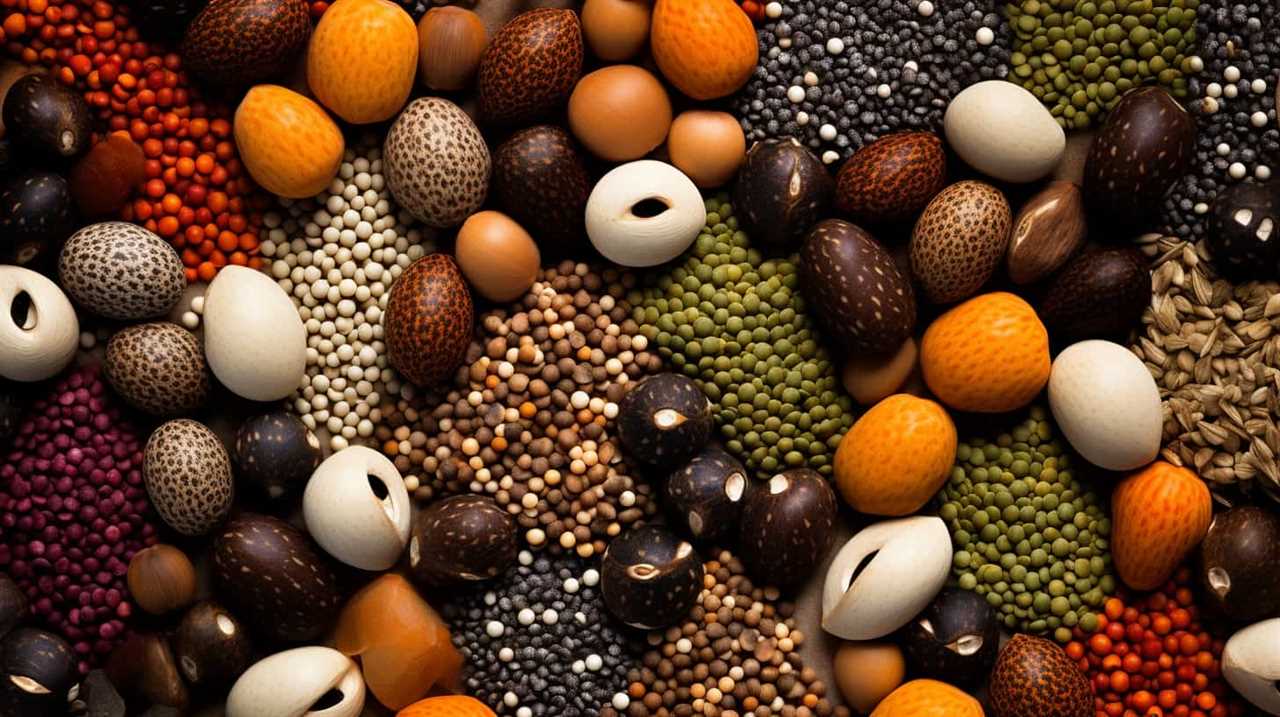
Remember to drink plenty of water when consuming chia seeds to ensure optimal digestion.
Chia Seeds in Gluten-Free Baking and Cooking
To maximize the nutrition in our gluten-free diets, we can utilize chia seeds in various baking and cooking recipes. Chia seeds are a versatile ingredient that can be easily incorporated into many dishes, adding a nutritional boost.
One way to incorporate chia seeds is by adding them to smoothies. They can be mixed with fruits, vegetables, and other ingredients to create a delicious and nutritious beverage.
Chia seeds can also be used in salad dressings. By blending them with oil, vinegar, herbs, and spices, you can create a flavorful dressing that isn’t only gluten-free but also packed with omega-3 fatty acids and fiber.
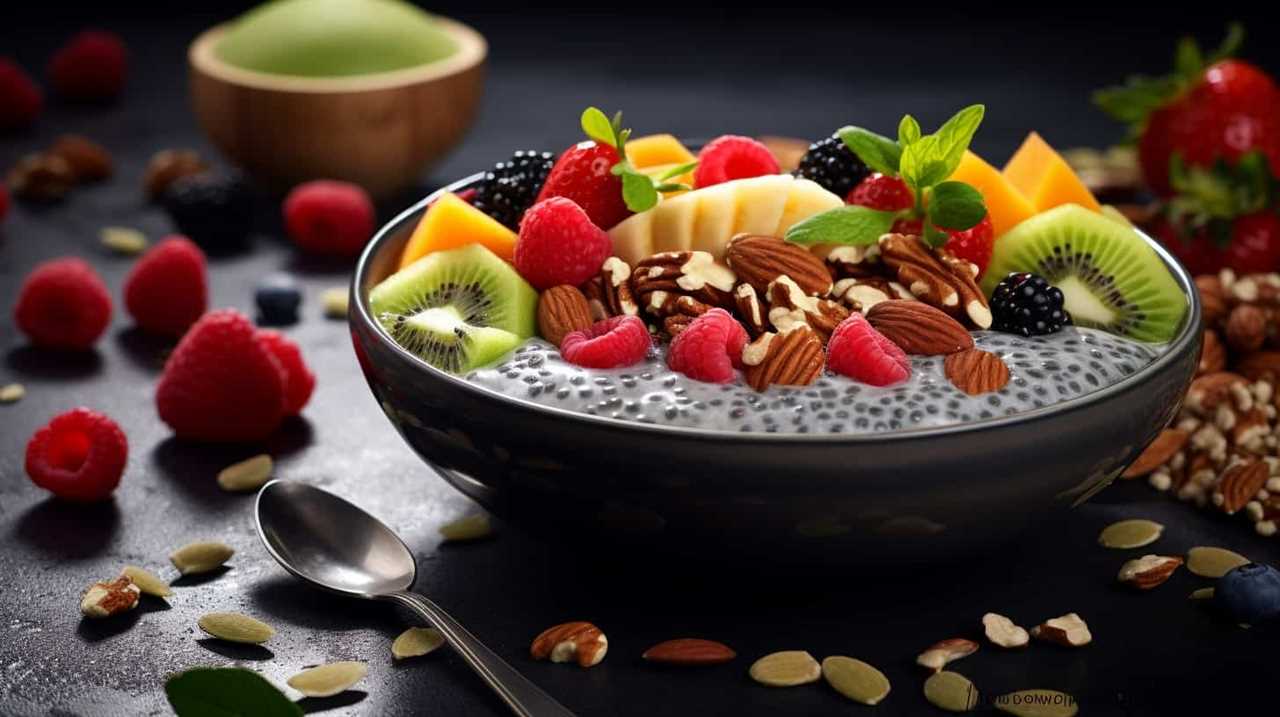
Frequently Asked Questions
Can Chia Seeds Be Used as a Substitute for Eggs in Gluten-Free Baking?
Yes, chia seeds can be used as a substitute for eggs in gluten-free baking. They act as a binding agent in recipes and are also a great source of omega-3 fatty acids in gluten-free diets.
Are There Any Potential Side Effects or Risks Associated With Consuming Chia Seeds?
When it comes to the potential side effects and risks of consuming chia seeds, it’s important to stay informed. While generally safe, some individuals may experience digestive discomfort or allergic reactions.
How Should Chia Seeds Be Stored to Maintain Their Freshness and Nutritional Value?
To maintain the freshness and nutritional value of chia seeds, store them in an airtight container in a cool, dry place. Incorporate chia seeds into your diet by using them in various recipes for added nutrition.
Can Chia Seeds Help With Reducing Inflammation in the Body?
Yes, chia seeds can help reduce inflammation in the body. They are packed with omega-3 fatty acids, which have been shown to have anti-inflammatory properties. Incorporating chia seeds into a gluten-free diet can also support weight loss and heart health.
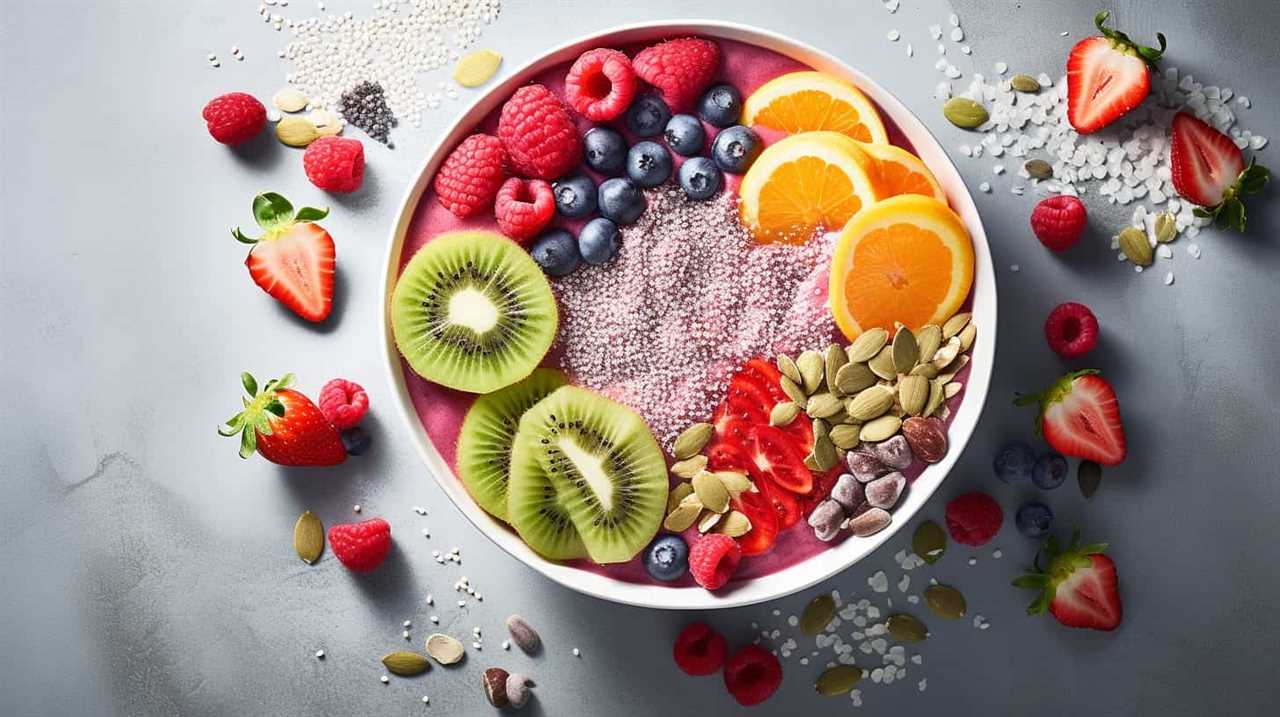
What Is the Recommended Daily Intake of Chia Seeds for Optimal Health Benefits?
For optimal health benefits, the recommended daily intake of chia seeds varies depending on factors such as age, sex, and overall health. Incorporating chia seeds into smoothies and using chia seed recipes can be a great way to maximize their nutritional value.
Conclusion
Incorporating chia seeds into gluten-free diets is a simple and effective way to maximize nutrition. These tiny seeds are packed with essential nutrients such as fiber, omega-3 fatty acids, and plant-based protein.
They can be easily added to everyday meals, boosting both the taste and nutritional value. Whether you sprinkle them on your morning yogurt or use them in gluten-free baking, chia seeds offer a versatile and nutritious addition to any diet.
Don’t underestimate the power of these small seeds to enhance your overall health and well-being.
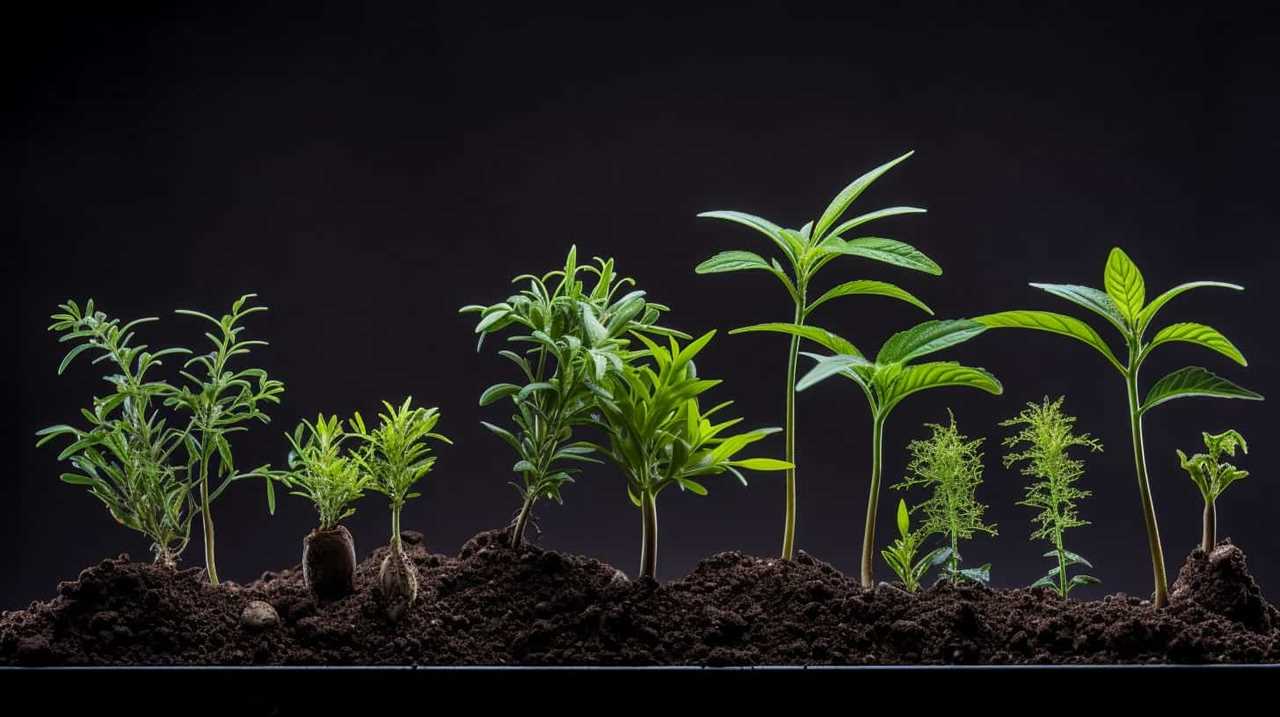
Hi, I’m Sarah. I write for Turtle Tree Seeds, a news blog that loves food – all kinds of food. But especially bacon, chocolate, and veggies. We’re on a mission to show the world that you can enjoy all of those things, even kale and brussels sprouts. Because we believe that when it comes to food, there’s no such thing as guilty pleasures. Just pleasures.
I’m also a huge fan of puns (obviously).
-

 Chia Seeds3 months ago
Chia Seeds3 months agoCan Cats Have Chia Seeds?
-

 Chia Seeds3 months ago
Chia Seeds3 months agoHow Do Chia Seeds Go Bad?
-

 Chia Seeds3 months ago
Chia Seeds3 months agoDo Chia Seeds Make You Poop?
-

 Health Risks and Allergies Related to Chia Seeds3 months ago
Health Risks and Allergies Related to Chia Seeds3 months agoWhy Do Chia Seeds Gel
-

 Chia Seeds3 months ago
Chia Seeds3 months agoHow to Use Chia Seeds For Weight Loss
-

 Chia Seeds and Digestive Health2 weeks ago
Chia Seeds and Digestive Health2 weeks agoWhy Are Chia Seeds Beneficial For Gut Health?
-

 Chia Seeds3 months ago
Chia Seeds3 months agoHealth Benefits of Chia Seeds For Dogs
-

 Chia Seeds in Gluten-Free Diets2 months ago
Chia Seeds in Gluten-Free Diets2 months agoYour Dependable Guide: Chia as a Gluten Substitute






